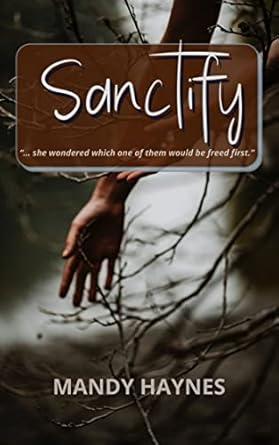

The Curious Calling of Leonard Bush
Susan Gregg Gilmore
Young Leonard Bush buries his lost leg and saves his whole East Tennessee town in this winsome and miracle-making novel.
When twelve-year-old Leonard Bush loses his leg in a freak accident, he decides to give his leg a proper burial in the hilltop cemetery of his East Tennessee town. This event somehow sets off a chain of miraculous and catastrophic events—upending the lives of Leonard’s rigidly God-fearing mother, June; his deeply conflicted father, Emmett; and his best friend,Azalea, and her mother, Rose, who is also the town prostitute. While the local Baptist minister passes judgment on events and promises dire consequences, the people of this small community on the banks of Big Sugar move together toward awakening.
Susan Gilmore’s love of storytelling flows naturally from her Tennessee roots. She’s the daughter of a revival preacher’s son, brought up on the land and streams that populate this novel that is, asAppalachian novelist Lee Smith says, a “homespun Pilgrim’s Progress.”
“The Curious Calling of Leonard Bush is a call to readers to stop what they’re doing and read! Humorous, heartfelt, and sometimes harrowing, Susan Gregg Gilmore introduces us to a compelling cast of characters and a community built on a system of give-and-take. At the center of it all is young Leonard, his early loss a transforming lesson to everyone around him.”—Jill McCorkle, Old Crimes and Life After Life
“Each fully developed character has a role to play in this moving and unusual novel, a homespun Pilgrim's Progress set at a dairy farm on Big Sugar River in East Tennessee in 1961. When twelve-year-old Leonard Bush loses his leg in a freak accident, a chain of miraculous and catastrophic events is set in motion, inevitable as the dire judgment of the local Primitive Baptist Church. Leonard's rigid, God-fearing mother, June; his secret-bearing father, Emmett; Leonard's best friend, Azalea, and her troubled mother, Rose, the local whore, are only the protagonists in a story played out by the entire community. Gilmore knows how to move the suspenseful events right along to its brilliant and moving conclusion. A big, generous novel, a really good read.”—Lee Smith, The Last Girls and Silver Alert
Susan Gregg Gilmore was born in Nashville, Tennessee. Her mother, a painter, and her father, the son of a revival-bred preacher, influenced her love of storytelling. Susan and her three siblings spent much of their summers with their grandparents outside of Nashville where they fished, swam, caught lighting bugs, and learned to grow the perfect tomato.
After graduating from the University of Virginia, Susan worked as a secretary for the Smithsonian Institution.And after graduating with a Master's degree from the University of Texas, she birthed three babies, whipped up cookies for bake sales, chaired community fundraisers, taught Sunday School, and somewhere along the way freelanced for newspapers like the Los Angeles Times and the Christian Science Monitor.
Susan now lives in Chattanooga, Tennessee, and her writing is rooted in the rich land she calls home.


Did you miss last month’s issue? No worries, click here to find it as well as all the past issues.








End Times by John M. Williams
Finalist for the 2025 Townsend Prize in Georgia.
"Mystical Dark Comedy"
Brother and sister soulmates Jon Karl and Summer Odom, orphaned at an early age and thrust into the human comedy of a small southern town, must survive a variety of predators, especially a sociopathic barber who abducts Jon Karl, forcing Summer to access a surprising inner strength that changes both their lives.
After the death of their mother, Maryrell, Jon Karl and Summer Odom are raised in the town of Douvale by their grandmother, Mildra, whose boss, Spruill Dawes, steps into the role of surrogate father. Jon Karl befriends his son Millard. Jon Karl, sexually precocious, finds himself increasingly humiliated by the ravenousness of Douvale women and yearns for a hermit life while mythologizing the few women he likes to think actually loved him. Summer attracts oddball boys which sends her through a series of ill-suited males and strange jobs.
Complications arise when Balch, a local barber, becomes obsessed with Jon Karl, and even more arise when Jon Karl catches the eye of Vance, a young strip club owner and porn filmmaker. Then, when Jon Karl gets into an ill-advised cannabisgrowing scheme, he leaves himself vulnerable to blackmail by Vance. Things get worse when Jon Karl is sentenced to the for-profit Baptist correction center run by Spruill’s hated rival, PruetEchols, and he finds Balch working there. One day, Summer’s intuition of something wrong sends her, Spruill, and the sheriff into a ghastly scene and a dangerous rescue of Jon Karl. Jon Karl is released to pursue at last the life he longs for, but becomes increasingly seduced by the strange energy of an abandoned roadside house and the oddly familiar portal it seems to offer. Summer has uneasy premonitions about the house, and with the legacy of a young son from one of her earlier boyfriends, and at last a promising relationship with the latest, survives.
“Not since William Price Fox sent his gullible Yankee down the Dixiana Highway under the Dixiana Moon has there been such a picaresque novel of pleasure and perfect pitch. John M. Williams has avoided kudzu-choked cliché and found rich humor and pathos in sibling orphans, Jon Karl and Summer, left to fight their way through poverty, porn and the Deep South. What’s more, he’s added to the literary stable of Wise Men – think Sam the Lion and Gus McRae -- with Redwine Pyle, the font of all beer cooler wisdom. With crazy but believable characters that would make Flannery O’Connor dizzy,Williams paints his masterpiece. If you can put this book down, you are tired of life.” —Rheta Grimsley Johnson, author of Enchanted Evening Barbie and The Second Coming.
“Jon Karl and Summer Odom, siblings attached at the hip and heart, navigate a fascinating cast of both ne'er-do-wells and do-gooders in the tiny southern town of Douvale, Georgia, in this novel of Biblical proportions. Both comical and tragic, John Williams's End Times offers a glimpse of small-town characters wanting to get out, as the reader understands that, perhaps, getting out might be much worse. I loved living with these people, plus a dog named Food Stamp.” —George Singleton, author of The Curious Lives of Nonprofit Martyr
"It should be no surprise that John Williams has written a quirky novel driven by characters hovering in the "curious microcosm" of a small town (East Douvale), who try escaping to what must be a better life. Somewhere in the history of the South, these characters existed in droves, but this life has long faded away except in peculiar outposts, such as Williams' second novel, End Times. In the tradition of The Heart is a Lonely Hunter and Confederacy of Dunces, Williams is a masterful storyteller of the small southern town, richly layered and recreated in the unique flavor that will soon to be gone except in the pages of some finely crafted Southern Literature. Williams' characters are endearing, and yet, not the folks you want to hang out with for the most part, because with their eccentricity comes a depth of loneliness and despair as everyone wants something better, and yet, receive, for the most part, only hope. In this novel, snippets of life, when accumulated, become an important mirror to judge one's life. With a dog named Food Stamp-a metaphor for all these characters' lives-you will fall for Maryrell; Ramp; Jon Karl, the baby; Daydream, the LPN; the well-endowed village idiot, Dunstan; and a host of other bizarre characters, including Balch the barber, who "knew that nothing in the world was what it looked like." Williams is the raconteur of lost souls trying to do well in this world, and with End Times, he does not disappoint." —William Walsh, author of Lakewood.

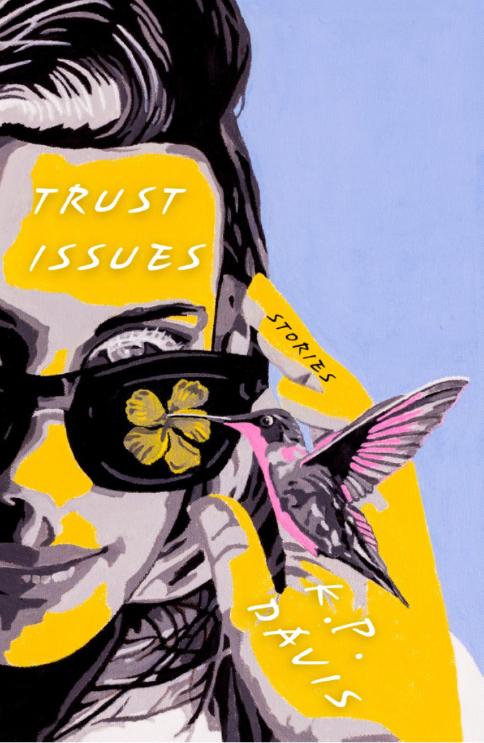
Someone or something lurks around every corner, but K.P. Davis’s characters have come prepared. These are women carrying on their daily struggles in a dangerous world, striving and searching for safety. They include Nell, an antisocial, nomadic, shade-tree mechanic and getaway driver; ‘Bula, an odd girl who talks to animals; and a whole host of others who follow lonely paths spreading empathy while kicking ass. The endings aren’t always happy, and these women have plenty of reasons to be afraid, but they keep on going. The twenty sharp, poignant, and biting stories in Trust Issues comprise a stunning beacon for hard-headed folk fighting to be heard when nobody listens.
*
“Davis hits hard and spares readers fantastical notions of the American Dream. These stories expose human vulnerability and ruthlessness through immersive and urgent scenes.”
—Jen Knox, author of Chaos Magic
Trust Issues: Stories K. P. Davis

Life Close to the Bone
by Michael Spake
John Greenburn used to be somebody. Now, he's just a middle-aged guy, sitting behind his computer screen, waiting for his life to come to a screeching halt. Cognitive-Pharma, a Floridabased pharmaceutical company withdeeppocketsandasecretto hide, has caught the attention of the U.S. Department of Justice. The allegation? Medicare fraud. Nooneismoreonthehookthan John, who, as the Chief Ethics OfficeratCognitive-Pharma,has been the canary in the coal mine for the last 12 months. Not that his CEO cares much.
The CEO, a flashy, profit-driven type, certainly doesn't care that John's own mother, Francis, is in desperate need of CognitivePharma's top-selling drug to slow her memory loss. Haunted by what he knows of the fraud allegations - and the investigation's impact on the thousands of patients who depend on the medicationJohn draws closer to the memories he has of his own mother, Francis, and the ways she pushed him to be somebody.And, not just somebody, but the greatest youth tennis player upstate South
Carolina had ever known. With Francis' memory deteriorating, John's time to understand both himself and his mother, a product of the rough mill town that shaped her, is slipping away.
Life Close to the Bone moves from present day Florida and back in time to John's successful tenure on the youth tennis circuit and the textile mill in upstate South Carolina that, through Francis, shaped John's adolescence. It depicts a matriarchal family's relentless striving to overcome their "linthead" heritage and explores what it means to live for yourself and, ultimately, to forgive parents shaped by their own generational hardship.
Michael Spake is a healthcare attorney and writer. His debut novel, Life Close to the Bone, a coming-of-age story about the shift in memory that comes with moving from adolescence to adulthood, as the story’s protagonist learns about love and loss in a textile mill town located in upstate, South Carolina.
Michael and his wife Mary Lucia celebrated their 27th wedding anniversary. They have four children (22, 18, 18, and 13).
Michael is fromAnderson, South Carolina and graduated with honors from The Citadel with a BA(English) in 1994.
Michael currently lives in Lakeland, Florida.At home, when not writing, he gardens and raises chickens.

Advance praise for The Wooblers:
“A gem of a story about overcoming obstacles and conquering fears. Engaging and heartwarming—an excellent resource for both students and teachers.” —Jill Fogle, Retired Teacher
“Enchanted and uplifted—children of any age will be charmed.”
Gloria Kenyon, MFA
“Delightful fantasy world brought to life with witty dialogue and warm illustrations.” —Millicent Flake,Author & Retired Media Specialist
“A modern parable for anyone who has struggled against the norm.” —Millicent Flake
“Charming illustrations bring this imaginative tale to life.”
Shannon Jochetz, 5th Grade Teacher
“You’ll never see the plot twist coming!” —Shannon Jochetz



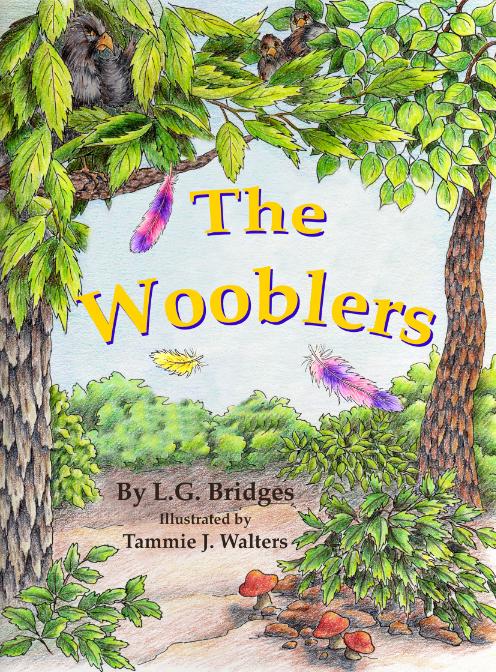
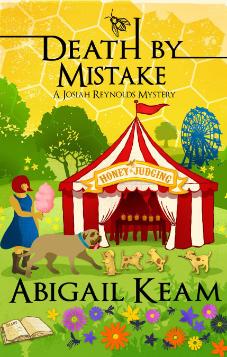
Death By Mistake:AJosiah Reynolds Mystery 22 byAbigail Keam
FIVE STARS! “I cheered out loud!” –Margery Tipton,Amazon Review
FIVE STARS! “Abigail Keam is a great storyteller!” –Carol Young, Goodreads Review
FIVE STARS! “Another fantastic mystery with no shortage of suspects!” -Miss W’s Book Reviews
FIVE STARS! WOW!!!!! JUST WOW!!!! This book is a page turner!” –Valerie Irwin, Amazon Review
FIVE STARS! “Great book. Lot’s of laughter and suspense!” Ginny Daly, Goodreads Review
FIVE STARS! “Abigail Keam’s stories always invoke the spirit ofAgatha Christie, the Grand Dame of the Murder Cozy.” –Jesse Coffey,Author of Deadly Memory
FIVE STARS! “The combination of mystery, personal relationships, intrigue, and relatability in Death by Mistake is refreshing, fun, and skillfully described. This mix is precisely what propels the storyline in the right direction and creates an atmosphere of mystery and anticipation throughout the entire book. The author’s easy-going, descriptive style of writing makes Death by Mistake a truly compelling title.” –Readers Favorite
FIVE STARS! "Death By Mistake" is a triumph of storytelling—a tale where secrets simmer beneath the Kentucky sun, and the search for truth is as intoxicating as the finest oak-cured bourbon. With a cast of characters that leap off the page and a plot that twists and turns like a Bluegrass country road, this installment is a must-read for mystery lovers and Josiah fans alike. Trust me, you won't want to miss a single, suspense-filled moment!” –Tambi Smith, Tambi Smith Book Reviews.
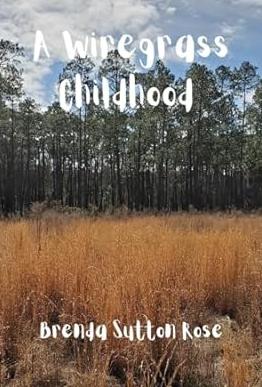
A Wiregrass Childhood by
Brenda Sutton Rose
During the early years of America, in the wiregrass country of Irwin County, Georgia, two brothers and a strange boy meet by chance in the local river that runs deep with memory and myth, history and vitality. Micah is a quiet, sensitive boy with a rare ear for music. His older brother, Isaac, watches the world with the steady eye of someone wiser than his years. And Oak, a Creek boy from a nearby village, carries the weight of his people's stories and the silent worry of what's to come. They didn't mean to find each other, yet somehow it seems fated to be. Friendship grows in the hush of pine forests and the music drifting from Micah's violin--friendship that defies the hard lines drawn between settlers and native people as they navigate a tumultuous time of tension between the Creek natives and white settles.
Blending history and fiction, A Wiregrass Childhood is a tender, haunting story of connection, land, and the quiet courage of boyhood.
Motown, the crossover label made rhythm and blues the soul ofAmerican popular culture. Join us in honoring the artists connected to Hitsville, USA, and 30 years’worth of “The Sound of Young America.” We asked contributors to show us their knowledge of Motown, its history and its place amongst R&B, soul, and Hip-Hop. We invited them to pay homage to the greats and this new poetry anthology is the result.


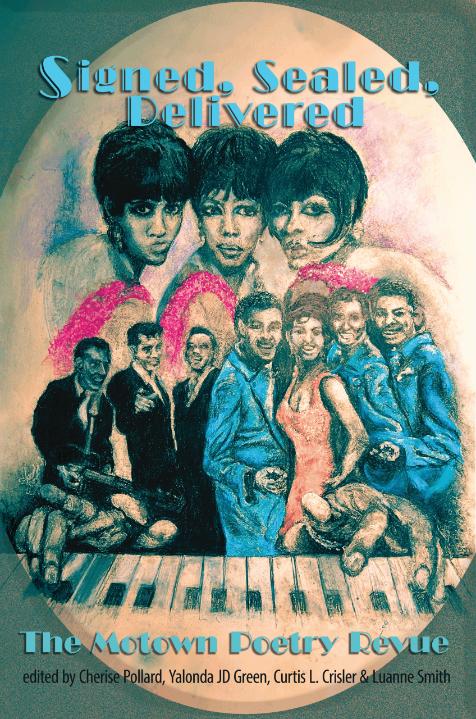

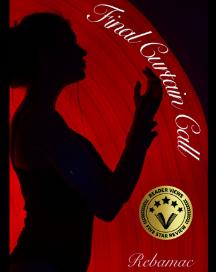
Set against the lush yet turbulent backdrop of Nepal during the COVID-19 pandemic, Like Water on Leaves of Taro weaves together themes of loss, resilience, identity, and hope. The memoir honors sacred rituals and everyday heartbreaks, from the thirteenth-day death feast to a father's wish to spare his daughter further grief. Through poetry, reflection, and memory, the author invites readers to witness the quiet strength of family, the complexity of Nepali culture, and the universality of sorrow.
This is not just a story of illness and loss-it is a meditation on what it means to be human, to mourn, to endure, and to carry love forward in a world that feels constantly in flux.
For readers of When Breath Becomes Air, The Year of Magical Thinking, and The Long Goodbye, Like Water on Leaves of Taro offers a moving cross-cultural perspective on grief, devotion, and the enduring lessons of death.
Sandra Gail, a charismatic dreamer.Taught to work hard by her caring father, she believed she could have anything she wanted.
Charles Black, her knight in shining armor. He was everything she ever wanted, the answer to her most important dream. Or so she thought.
The dream was to be an adored wife, loving mother, and exceptional nurse. A dream that would be quickly haunted by a reality she could have never imagined. She would soon find herself caught in a webbed triangle of three main characters that would change the course of her life forever.
Slowly taken captive with no escape in sight, Sandra struggled through the darkest days of her life. Battered and beaten down, emotionally and physically; wounded from torture, deceit, and betrayal, she still prayed for a way out.
Before long, she found she had two reasons for living: Alex and Little Noah. Now she had a reason to fight, even if the cost was her life, determined to have peace at the Final Curtain Call.

Your thoughts, dreams, and experiences deserve to be heard— especially by you. In just fifteen to twenty minutes each week, Write Your Heart Out invites you to come along on a transformative journey of self-discovery through the simple, powerful act of putting pen to paper. Author and publisher Vickie McEntire has crafted 52 thought-provoking prompts that guide you to explore your inner landscape and uncover insights you didn’t know were waiting.
Journaling isn’t just about recording events; it’s about understanding yourself more deeply, processing emotions, and gaining clarity on what truly matters in your life.
Whether you’re seeking to heal from past wounds, find motivation for new beginnings, or simply process life’s daily challenges, this journal offers a safe space for honest reflection. Writing has an extraordinary ability to reduce anxiety and frustration, and help you move forward with greater balance. Write Your Heart Out removes the guesswork from journaling with structured yet flexible exercises that meet you exactly where you are. No experience necessary—just an openness to explore, discover, and transform through the therapeutic power of your own words.
Your journey to a more empowered life begins today.

At Colorful Crow Publishing, our mission is to amplify diverse voices and champion stories that resonate across communities. We believe every story matters, and we are dedicated to creating a welcoming, supportive platform for authors to share their unique perspectives. By fostering a collaborative environment, we aim to publish works that inspire, connect, and make a lasting impact on readers everywhere.


Simplicity from Sutherland Place by Jamie Lee Bacon
Welcome to the Kitchen — No
Experience Required.
Cooking has always been more than just making food for me— it’s about connection, creativity, and confidence. My journey began in childhood, watching my grandmother effortlessly transform simple ingredients into something magical. She taught me that cooking isn’t just about following recipes. It’s about experimenting, savoring the process, and finding joy in the creation of a meal.
If you’re new to the kitchen, don’t worry! You don’t need years of experience or fancy equipment to make great food. This book is designed to guide you through the basics, helping you build skills, gain confidence, and, most importantly, enjoy cooking. Whether it’s your first time behind the stove or you’re looking to sharpen your technique, I will walk you through every step to make your time in the kitchen fun and stress-free.And, of course, tasty.
So, grab an apron, take a deep breath, and let’s get started. The kitchen is officially yours.

Double Stuffed Sweet Potatoes
Simplicity time: 1 hour. Serves 1 or more.
Double-stuffed sweet potatoes, also known as twice-baked sweet potatoes, are a delightful combination of creamy, sweet, and savory flavors.
Enjoy putting these simple recipes to the test and remember that a recipe is just a guideline! Don’t be afraid to get creative in the kitchen.
With love from Sutherland Place, 1839.


This essay collection spans a lifetime’s worth of characters, settings, themes, and ways of organizing. It is, after all, a collection of Gary Fincke’s best work. Yet, for the variety of content covered, from coming-of-age to family to nuclear weapons to space exploration to mass shootings to rock attacks on cars to the author’s mother’s obsession with potato chips, this collection has a durable thread that ties them all together: the need to observe and record everything. Struggle and resilience. Fear and pleasure. Faith and despair. Love and loathing.All of those tensions are closely examined within the shadow cast by death. As Gary Fincke writes, “Somewhere, early every day, I think the acolyte of terror dreams our bodies as it decides the exact address for delight.” This “thinking,” in essay after essay, is brilliantly articulated in an ever-evolving, contemporary style. The metaphors are beautiful, the prose is clipped and clean, and the reader is constantly surprised by the connections Fincke draws like the one between his daughter and Charles Manson. A panorama of screams, another of hearts, another of headlights, all of them transformed into memoir. The subjects as varied as a four-part exploration of different kinds of hands, a meditation on terror and the fireworks American children know as Sparklers, and eulogies seeded by love of potato chips and crossword puzzles. Like the best essays, all of these “discover” in an intimate, personal way.

Momma May Be Mad: A Memoir is an inventive and striking memoir about motherhood, madness, and the grace of second and third chances. Kerry Neville shares the story of how she was caught in the perfect storm of bipolar disorder, anorexia, and alcoholism when her children were young and her marriage failing and how she found her way back to joy and hope. Electric shock therapy, hospitalizations, and even an exorcism were desperate, if failed, lifelines. But even in that dark chaos, she held fast to an abiding belief in love and fought to regain her own life and her life with her children.
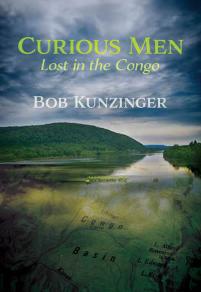
To be released January 4, 2026.
An experienced adventurer partners with an innocent nineteen-year-old to plan a journey on the most dangerous river in the world. What starts as one man’s dream ends up as another man’s nightmare. It was a time when pushing our limits knew no boundaries and being nineteen had no restrictions.

MADVILLE PUBLISHING seeks out and encourages literary writers with unique voices. We look for writers who express complex ideas in simple terms. We look for critical thinkers with a twang, a lilt, or a click in their voices. And patois! We love a good patois. We want to hear those regionalisms in our writers’ voices. We want to preserve the sound of our histories through our voices complete and honest, dialectal features and all. We want to highlight those features that make our cultures special in ways that do not focus on division, but rather shine an appreciative light on our diversity.

In Best of 2024 Volume One, you’ll find fifty-one submissions. Three were nominated for a Pushcart Prize: The Hanging by Doug Gray, Sandy Tells Me About Dead Pine Trees by J.D. Isip, and Wilma by Phyllis Gobbell.
Contributors: Carolyn Haines, Doug Gray, Angela Patera, Kimberly Parish Davis, Michael Spake, Jennifer Smith, Ashley Tunnell, Ken Gosse, Dr. Elizabeth V. Koshy, Ann Hite, Ellen Notbohm, Micah Ward, Malcolm Glass, Katie Crow, Lorraine Cregar, Patricia Feinberg Stoner, John M. Williams, Michael Lee Johnson, J.D. Isip, Casie Bazay, Jacob Strunk,Ann ChristineTabaka, Joan McNerney, Fhen M., Steven Kent, Peter Magliocco, Mark Braught, RitaWelty Bourke, Loretta Fairley, Barbara Anna Gaiardoni, S. Dodge, DeLane Phillips, Candice Marley Conner, Arvilla Fee, J. B. Hogan, Ramey Channell, Hope Kostedt, John Grey, Martha Ellen Johnson, Nancy Chadwick-Burke, Mike Coleman, Margaret Pearce, Nicole Irizawa, Donald Edwards, Janet Lynn Oakley, Mandy Jones, Phyllis Gobbell, and Suzanne Kamata
Cover art by Lindsay Carraway
In Best of 2024 Volume Two, you’ll find fifty-two submissions. Three submissions in this volume were nominated for a Pushcart Prize: Hanging Pictures by Micah Ward, The Lone and Level Sands by James Wade, and American Chestnut by Candace Connor.

Contributors: Candice Marley Conner, Kaye Wilkinson Barley, Mike Ross, Will Maguire, AJ Concannon, Patricia Feinberg Stoner, Gregg Norman, Robin Prince Monroe, Ramey Channell, April Mae M. Berza, Anne Leigh Parrish, B. A. Brittingham, Mike Austin, Sara Evelyne, Jennifer Smith, Loretta Fairley, J.L. Oakley, Celia Miles, Kris Faatz, Ed Nichols, Linda Imbler, Annie McDonnell, Mike Turner, Micah Ward, James Wade, Ashley Tunnell, John M. Williams, Robb Grindstaff, Stevie Lyon, Laura McHale Holland, Saeed Ibrahim, Nancy Julien Kopp, Julie Green, DeLane Phillips, Shayla Dodge, Edilson Afonso Ferreira, Chris Wood, Jasna Gugić, Fhen M., Hubert Blair Bonds, Ellen Birkett Morris, Margaret Pearce, Ellen Notbohm, Kimberly Parish Davis, J. B. Hogan, and Royal Rhodes
Cover art by Lindsay Carraway

In Volume One, you’ll find thirty-eight submissions written by a fantastic mix of awardwinning authors and poets plus new ones to the scene. Three submissions in this volume were nominated for a Pushcart Prize: Miller’s Cafe by Mike Hilbig, Sleeping on Paul’s Mattress by Brenda Sutton Rose, and A Hard Dog by Will Maguire. The cover art is by artist, Lindsay Carraway, who had several pieces published in February’s issue.
Contributors: Jeffrey Dale Lofton, Phyllis Gobbell, Brenda Sutton Rose, T. K. Thorne, Claire Hamner Matturro, Penny Koepsel, Mike Hilbig, Jon Sokol, Rita Welty Bourke, Suzanne Kamata, Annie McDonnell, Will Maguire, Joy Ross Davis, Robb Grindstaff, Tom Shachtman, Micah Ward, Mike Turner, James D. Brewer, Eileen Coe, Susan Cornford, Ana Doina, J. B. Hogan, Carrie Welch, Ashley Holloway, Rebecca Klassen, Robin Prince Monroe, Ellen Notbohm, Scott Thomas Outlar, Fiorella Ruas, Jonathan Pett, DeLane Phillips, Larry F. Sommers, Macy Spevacek, and Richard Stimac
InVolumeTwo, you’ll find fortythree submissions written by a fantastic mix of award-winning authors and poets plus new ones to the scene. Three submissions in this volume were nominated for a Pushcart Prize: A Bleeding Heart by Ann Hite, A Few Hours in the Life of a Five-Year-Old Pool Player by Francine Rodriguez, and There Were Red Flags by Mike Turner. The cover art for Volume Two is by artist, DeWitt Lobrano, who had several pieces published in November’s issue. Enjoy!

Contributors: Ann Hite, Malcolm Glass, Dawn Major, John M. Williams, Mandy Haynes, Francine Rodriguez, Mike Turner, Mickey Dubrow, William Walsh, Robb Grindstaff, Deborah Zenha Adams, Mark Braught, B. A. Brittingham, Ramey Channell, Eileen Coe, Marion Cohen, Lorraine Cregar, John Grey, J. B. Hogan, Yana Kane, Philip Kobylarz, Diane Lefer, Will Maguire, David Malone, Ashley Tunnell, Tania Nyman, Jacob Parker, LaVern Spencer McCarthy, K. G. Munro, Angela Patera, Micheal Spake, George Pallas, Marisa Keller, Ken Gosse, and Orlando DeVito
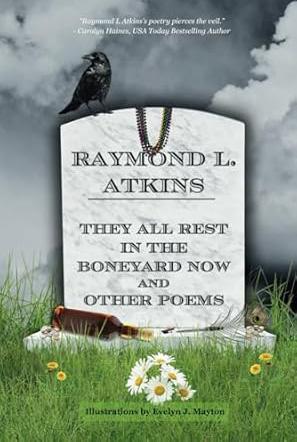
TheyAll Rest in the Boneyard Now by
Raymond L.Atkins (Author), Evelyn Mayton (Illustrator)
“Raymond Atkins writes with intuitive wisdom, as he channels those from beyond the grave. His poetry gives voice to those who once mattered, those who time wants us to forget. In They All Rest in the Boneyard Now, Atkins wrestles death from the dusty clay and breathes life into dry bones while reminding us that every soul who once had breath is worthy of being remembered. These saints, sinners, socialites, and the socially inept are all victims of time, or circumstance, as we too shall one day be. Atkins offers salvation to all who are tormented, and solace to those who seek eternal rest.”
– Renea Winchester,Award-winning author of Outbound Train
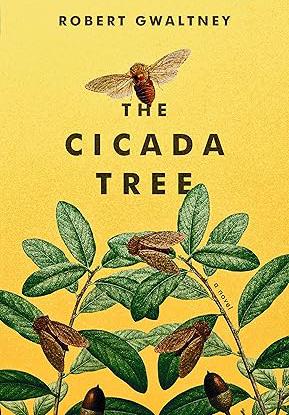
The Cicada Tree by
Robert Gwaltney
The summer of 1956, a brood of cicadas descends upon Providence, Georgia, a natural event with supernatural repercussions, unhinging the life of Analeise Newell, an eleven-year-old piano prodigy. Amidst this emergence, dark obsessions are stirred, uncanny gifts provoked, and secrets unearthed.
During a visit to Mistletoe, a plantation owned by the wealthy Mayfield family, Analeise encounters Cordelia Mayfield and her daughter Marlissa, both of whom possess an otherworldly beauty, a lineal trait regarded as that Mayfield Shine. A whisper and an act of violence perpetrated during this visit by Mrs. Mayfield all converge to kindle Analeise’s fascination with the Mayfields.
Analeise’s burgeoning obsession with the Mayfield family overshadows her own seemingly, ordinary life, culminating in dangerous games and manipulation, setting off a chain of cataclysmic events with life-altering consequences—all of it unfolding to the maddening whir of a cicada song.

IAm a Georgia Girl: The Life of Lucille Selig Frank, 18881957
byAnn Hite
Twenty-five-year-old Lucille Selig Frank's whole life changed onApril 26, 1913, as the Confederate Memorial Parade marched throughAtlanta, Georgia. Lucille was attending the opera matinee with her mother. Her husband, Leo Frank, sat in his office in the National Pencil Company, where he was superintendent, working on a financial report. The brutal murder of fourteen-year-old Mary Phagan, an employee of Leo's, took place in the pencil factory that day. Lucille's husband would be the last known person to see Mary alive. While much has been written about Mary Phagan's murder and Leo Frank's subsequent trial over the past 115 years, very little has given voice to Lucille Selig Frank and other women connected to the horrific events that took place between 1913-1915. Lucille was part of a mission to make Governor John Slaton aware of the antisemitism being shown to Leo during his arrest and trial. She paid a heavy price for her courage. The story of Lucille and the women connected to this case is as timely today as it was in the early 1900s. This book has many diverse characters, including place which influences the outcome. Within this complexity, Hite's telling of Lucille's story will help others see that antisemitism, the marginalization of women, and mobs taking justice into their own hands cannot be tolerated. How many people were complicit in Leo and Lucille's journey? Was justice truly served? This book leaves the reader to answer these questions.

Red Clay Suzie by
Jeffrey Dale Lofton
Anovel inspired by true events. The coming-of-age story of Philbet, gay and living with a disability, battles bullying, ignorance, and disdain as he makes his way in life as an outsider in the Deep South—before finding acceptance in unlikely places.
Fueled by tomato sandwiches and green milkshakes, and obsessed with cars, Philbet struggles with life and love as a gay boy in rural Georgia. He’s happiest when helping Grandaddy dig potatoes from the vegetable garden that connects their houses. But Philbet’s world is shattered and his resilience shaken by events that crush his innocence and sense of security; expose his misshapen chest skillfully hidden behind shirts Mama makes at home; and convince him that he’s not fit to be loved by Knox, the older boy he idolizes to distraction. Over time, Philbet finds refuge in unexpected places and inner strength in unexpected ways, leading to a resolution from beyond the grave.
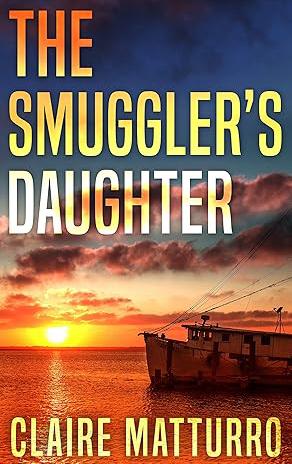
The Smuggler's Daughter by
Claire Matturro
Ray Slaverson, a world-weary Florida police detective, has his hands full with the murders of two attorneys and a third suspicious death, all within twenty-four hours. Ray doesn’t believe in coincidences, but he can’t find a single link between the dead men, and he and his partner soon smash into an investigative stonewall.
Kate Garcia, Ray’s fiancée, knows more than she should. She helped one of the dead attorneys, just hours before he took a bullet to the head, study an old newspaper in the library where she works. Kate might be the only person still alive who knows what he was digging up— except for his killer.
When Kate starts trying to discover what’s behind the murders, she turns up disturbing links between the three dead men that track back to her family’s troubled past. But she has plenty of reasons to keep her mouth shut. Her discovery unleashes a cat-and-mouse game that threatens to sink her and those she loves in a high tide of danger.
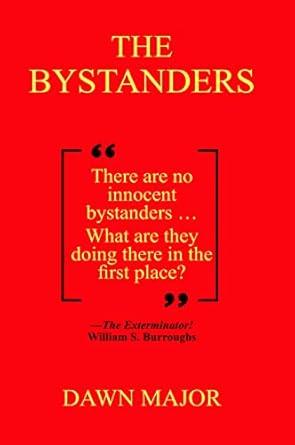
The Bystanders by Dawn Major
The quaint town of Lawrenceton, Missouri isn’t sending out the welcoming committee for its newest neighbors from Los Angeles—the Samples’ family. Shannon Lamb’s “Like a Virgin” fashion choices, along with her fortune-telling mother, Wendy Samples, and her no-good, cheating, jobless, stepfather, Dale Samples, result in Shannon finding few fans in L-Town where proud family lines run deep. Only townie, Eddy Bauman, is smitten with Shannon and her Valley Girl ways. The Bystanders is a dark coming-of-age story set in the 1980s when big hair was big, and MTV ruled. In a quiet town of annual picnics and landscapes, the Samples’ rundown trailer and odd behaviors aren’t charming the locals. Shannon and Wendy could really use some friends but must learn to rely upon themselves to claw their way out of poverty and abuse if they want to escape Dale.
The Bystanders pays homage toAmericana, its small-town eccentricities, and the rural people of the Northern Mississippi Delta region of Southeast Missouri, a unique area of the country where people still speak Paw Paw French and honor Old World traditions.

The Girl from the Red Rose Motel:ANovel by Susan Beckham Zurenda
Impoverished high school junior Hazel Smalls and privileged senior Sterling Lovell would never ordinarily meet. But when both are punished with in-school suspension, Sterling finds himself drawn to the gorgeous, studious girl seated nearby, and an unlikely relationship begins. Set in 2012 South Carolina, the novel interlaces the stories of Hazel, living with her homeless family in the rundown Red Rose Motel; Sterling, yearning to break free from his wealthy parents' expectations; and recently widowed Angela Wilmore, their stern but compassionate English teacher. Hazel hides her homelessness from Sterling until he discovers her cleaning the motel's office when he goes with his slumlord father to unfreeze the motel's pipes one morning. With her secret revealed, their relationship deepens. Angela-who has her own struggles in a budding romance with the divorced principal-offers Hazel the support her family can't provide. Navigating between privilege and poverty, vulnerability and strength, all three must confront what they need from themselves and each other as Hazel gains the courage to oppose boundaries and make a bold, life-changing decision at novel's end.

The Best of the Shortest: ASouthern Writers Reading
Reunion by
Suzanne Hudson (Author, Editor), Mandy Haynes (Editor), Joe Formichella (Author, Editor)
“Some of the happiest moments of my writing life have been spent in the company of writers whose work is included in these pages. They all brought their A-game to this fabulous collection, and at our house it is going on a shelf next to its honored predecessors. The only thing that saddens me is that the large-hearted William Gay is not around to absorb some of the love that shines through every word.” ―Steve Yarbrough
“The Best of the Shortest takes the reader on a fast-paced adventure from familiar back roads to the jungles of Viet Nam; from muddy southern creek banks to the other side of the world, touching on themes as beautiful as love and as harsh as racism. However dark or uplifting, you are guaranteed to enjoy the ride.” --Bob Zellner
“I had some of the best times of my life meeting, drinking and chatting with the writers in this book, times matched only by the hours I spent reading their books. This collection showcases a slice of Southern literature in all its complicated, glorious genius. Anyone who likes good writing will love it.” --Clay Risen
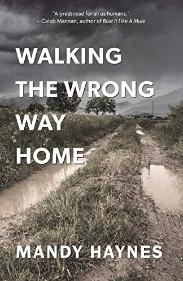

Walking The Wrong Way Home by Mandy Haynes
Spanning nearly twenty decades, the struggles and victories these characters face are timeless as they all work towards the same goal.
A place to feel safe, a place to call home.
Sharp as a Serpent's Tooth: Eva and other stories by Mandy Haynes
Each story features a female protagonist, ranging from ten to ninety-five years of age. Set in the south, you’ll follow these young women and girls as they learn that they’re stronger than they ever thought possible.

Oliver by Mandy Haynes
“Dear God…and Jesus and Mary…” Even though eleven-year old Olivia is raised Southern Baptist, she likes to cover her bases when asking for a favor. Unlike her brother Oliver, she struggles with keeping her temper in check and staying out of trouble. But Oliver is different, and in the summer of ’72 he proves to Olivia there’s magic in everything - it’s up to us to see it.
Mandy Haynes spent hours on barstools and riding in vans listening to great stories from some of the best songwriters and storytellers in Nashville, Tennessee. After her son graduated college, she traded a stressful life as a pediatric cardiac sonographer for a happy one and moved to an island off the east coast. She is a contributing writer for Amelia Islander Magazine, Amelia Weddings, and editor of Encounters with Nature, an anthology created by Amelia Island writers and artists. She is also the author of two short story collections, Walking the Wrong Way Home, Sharp as a Serpent's Tooth Eva and Other Stories, and a novella, Oliver. She is a co-editor of the Southern Writers Reading reunion anthology, The Best of the Shortest. Mandy is the editor-in-chief of WELL READ Magazine and the editor of four WELL READ anthologies.
Like the characters in some of her stories, she never misses a chance to jump in a creek to catch crawdads, stand up for the underdog, or the opportunity to make someone laugh. At the end of 2024, Mandy moved back to middle Tennessee and now spends her time writing and enjoying life as much as she can.
If you’d like to feature your work in the reading recommendation section with live links to your website and purchase link, and personalized graphics of your ad shared to WELLREAD Magazine’s social sites, click here to see examples of the different options and moreinformation.
Click here for more information on purchasing a cover.
Don’t let the low prices fool you - WELL READ was created by an author who understands how much it costs to get your book in the best shape possible before it’s ready to be queried by agents, small presses, or self-published. Showing off your book and getting it in front of readers shouldn’t break the bank.
WELL READ Magazine receives approximately 8,000 views each month on Issuu’s site alone (the world’s largest digital publishing and discovery platform available). Your book will be included with the featured authors, great interviews, submissions, essays, and other fantastic books inside each issue. There is strength in numbers. Let’s get our books seen!
Ad rates for 2025:
$50 - One FULL PAGE AD
$75 - TWO-PAGE SPREAD
$100 - TWO HIGH IMPACT - FULL COLOR PAGES - (this is NOT a standard two page spread)
$100 - TWO-PAGE SPREAD to advertise up to THREE books with one live link to your website. For publishers only.
$75 BOOKSTORES, PUBLICISTS, AUTHORS - two-page spread to promote book events
$550 FRONT COVER - includes TWO full color interior pages for book description, author bio, and/or blurbs.
$350 INTERIOR COVER or BACK COVER - includes TWO additional full color interior pages for book description, author bio, and/or blurbs.
*All covers include a one page ad in the next three consecutive issues following the month your book is featured on a cover.
Prices include creating the graphics for the magazine pages and all social sites. Everything is taken care of for you.

INSIDE VOICES

“I don’t like absolute, black-and-white thinking. There is always so much gray matter to almost everything. I think that’s where our humanity lies — in the gray matter.”
Robert
Gwaltney and Jeffrey Dale Lofton
introduce Susan Gregg Gilmore
Susan Gregg Gilmore is the author of the novels The Curious Calling of Leonard Bush, Looking for Salvation at the Dairy Queen, The Improper Life of Bezellia Grove, and The Funeral Dress. She has written for the Chattanooga Times Free Press, the Los Angeles Times and the Christian Science Monitor. Born in Nashville, she lives in Tennessee with her husband.
Jeffrey: Leonard’s story begins with the loss of a leg—a traumatic and symbolic event. How did this idea come to you, and why was it important to start the novel there?
It was when I was teaching at the Appalachian Young Writers Workshop sponsored by Humanities Tennessee more than 10 years ago now. Those summers, I’d walk my high-school-aged students up to a small cemetery on the Lincoln Memorial University campus and ask them to develop a character based on (1) a tombstone and (2) all the clues the land around them had to offer. Well, there was one tombstone there that simply read, Leonard Bush’s Leg 1923. It fascinated me! I could’t let it go.And from that came The Curious Calling of Leonard Bush, albeit some 12 years later. (And only recently I’ve learned that the rest of the real Leonard Bush is buried on the other side of the highway!)
Robert: Leonard is such a unique and hopeful character despite his trauma. What was it like developing his voice?
Robert Gwaltney & Jeffrey Dale Lofton introduce Susan Gregg Gilmore
Such a complete joy. Someone recently called him theTed Lasso of Appalachia, and I love that. Leonard feels things deeply, but he sees the hope and good in every moment and everyone. I always wanted to be more like Leonard.
Jeffrey: June and Emmett, Leonard’s parents, are deeply flawed but very human. How did you approach writing their conflicts— both internal and with each other?
Kind of helps having been married for 40 years! Husbands and wives, if they’re truly honest with one another, are going to have their share of conflict. And helpfully, resolution. So that part to write was rather easy. Or should I say organic or natural. But yes, Emmett and June come to the marital table with a lot of unresolved grief, and it took their son’s tragic loss for them to confront their own issues.And in the end, I think, save their marriage.
Robert: Azalea and her mother, Rose, are beautifully complicated characters. Can you talk about their relationship with Leonard and what they represent within the story?
Thank you for mentioning Rose and Azalea. Their pages were some of the hardest to write, but I love both characters, even Rose, who fails miserably time and time again at motherhood. Rose is the kind of mother that at first makes you so mad. She made me mad. But as I got to know her better, I cared deeply for her. She loved
Robert Gwaltney & Jeffrey Dale Lofton introduce Susan Gregg Gilmore
her daughter,Azalea.AndAzalea loved her mother, despite all her flaws. It was such a testament to the mother/child bond, both wanting/needing love from the other.
Jeffrey: Religion, judgment, and awakening are central themes. What were you hoping to explore or challenge through the town’s spiritual journey?
I don’t like absolute, black-and-white thinking. There is always so much gray matter to almost everything. I think that’s where our humanity lies — in the gray matter. Interestingly, I was raised a Southern Baptist, in the South, where hellfire-and-brimstone talk swirled about me all the time. But thankfully, my parents lived according to the New Testament not the Old. There was much grace in my household. Much more gray thinking. In all my books, my writing touches on this conflict of absolute thinking versus more critical thinking. And The Curious Calling of Leonard Bush was definitely no exception.
Robert: How does the setting of East Tennessee—and Big Sugar specifically—shape the characters’identities and choices?
I think we’re all shaped by the land from which we come. And fictional characters are no different. Leonard and Emmett and June and Azalea all live cradled in the foothills of the Great Smoky Mountains. I think they were nurtured by it. I know Leonard was.
Robert Gwaltney & Jeffrey Dale Lofton introduce Susan Gregg Gilmore
June may have felt stifled by it at times. She was in awe of Jackie Kennedy and the other beautiful women she saw on the cover of national magazines. But if given the choice, I doubt she would ever leave.
Jeffrey:The novel includes miraculous events. Did you intend to write magical realism, or do you see the story more as spiritual realism?
I think your question raises a very interesting point. No, quite honestly, I did not intend to write magical realism. Wasn’t where my head was at. But there are spiritual themes throughout the book.After all, Leonard is treading on the local preacher’s turf. On the other hand, magical and spiritual realism both incorporate elements beyond the physical world into the setting, right? And both force us to consider truths about life, faith, and our identity. So even though my intention to write magical realism was not there, I’m beginning to think I tapped into it a bit.
Robert: How did your own Southern background influence your depiction of this particular town and its people?
I spent every summer with my revival-bred grandfather and grandmother in a very small Middle Tennessee town. I had no idea then how deeply those summers with my grandparents would
Robert Gwaltney & Jeffrey Dale Lofton introduce Susan Gregg Gilmore
impact my writing. But it has, and I draw on that experience time and time again.
Jeffrey: What do you hope readers take away from Leonard’s journey? It may sound a little simplistic, or a little trite, but joy — perhaps hope.
Robert: What is next for you?
Well, I’m writing something I swore I’d never write, the sequel, or shall we say the companion book, to my first novel, Looking for Salvation at the Dairy Queen.


“Each fully developed character has a role to play in this moving and unusual novel, a homespun Pilgrim's Progress set at a dairy farm on Big Sugar River in East Tennessee in 1961. When twelve-year-old Leonard Bush loses his leg in a freak accident, a chain of miraculous and catastrophic events is set in motion, inevitable as the dire judgment of the local Primitive Baptist Church. Leonard's rigid, God-fearing mother, June; his secretbearing father, Emmett; Leonard's best friend, Azalea, and her troubled mother, Rose, the local whore, are only the protagonists in a story played out by the entire community. Gilmore knows how to move the suspenseful events right along to its brilliant and moving conclusion. A big, generous novel, a really good read.”
—Lee Smith, The Last Girls and Silver Alert



Click above to go to the BETWEEN THE PAGES YouTube channel, or on one of the links below to listen to the podcast. Please take a second to like and subscribe if you enjoy the channel - we appreciate you!






All of Appalachia is known for its magic, charms, and spirits. But there is something unique about Southern Appalachia. From the age of nine, I was raised by my granny, who was born in Southern Appalachia. My Appalachian roots go back to the early 1700s on her side of the family. From the minute I came to live with Granny, we made at least one trip a month to visit her sisters, my great aunts, who still lived in the backwoods of Appalachia. While in their presence, I learned Granny could be two separate women.At home she was a straight-laced, proper talking Southern lady ofAtlanta.At the old home place Granny evolved into another person, who dipped snuff and spoke a strange language I didn’t always understand.At the feet of these mountain women, I learned to be a storyteller that led me to be a writer. While at home, Granny wasn’t always forthcoming about her background. On one occasion when I was around three, my parents brought me to visit Granny. My dad was in the Air Force and we rarely got to visit Georgia. While Granny stayed home to cook us a big dinner, we went to a Sunday service in a cramped little church, where Dad attended as a kid. The preacher, who did a lot of screaming and yelling, was some kind of kin to Dad. Mother and Granny had never been much on attending church so this often caused friction between my parents. I got the wiggles like most kids my age would. Mother kept promising if I was good, we would soon be back at Granny’s house for one of her fine desserts. When we finally got back to Granny’s little bungalow on the outskirts of Atlanta, I was overjoyed. Granny gave me the run of
the house while she finished in the kitchen. I moved through each room, stopping in front of the floor mirror to flounce and admire my pink ruffled dress which Mother had made for me. Granny had an old-fashioned bathroom that I purely loved. The pink claw-foot tub captivated me. It was a bubble bath paradise.To enter and leave the bathroom, I had to pass an upright gas heater.
“Annie, come eat,” Granny called from the kitchen.
I slid by the heater faster than I probably should have, and one of the dress ruffles caught on the grate. Somehow in the process of freeing myself before the blue flames caught me, I placed my right palm on the top of the stove that was hot. For half of a minute, there was no feeling. Then a horrible pain shot through my hand and I screamed. Dad came running and tore my pretty dress, getting me away from the heater. He carried me to the kitchen table as I howled in pain. Granny came running. She took my hand, closed her eyes, and blew air on it.Abeautiful cool breeze eased the pain out of my body.
“I think we need to take her to the hospital,” Mother said, pushing her way closer to me.
I stopped crying.
“Just calm down.Ann is feeling better,” Dad reassured Mother. My fiery red hand faded to a normal color. Many years would pass before I understood what had taken place.
Fire-pullers have been part of Appalachia for centuries. Their ability to pull fire from a burn has never been viewed as magic, but as a gift from God. A person who is gifted with this ability uses a
secret Bible verse. In some cases, it is a charm instead. Both males and females are fire-pullers. If a fire-puller tells the Bible verse, they can no longer pull or blow the fire out of a burn. So the verse is guarded and only passed down to those seen fit to take up the gift. We don’t hear so much about fire-pullers now, but seventyyears ago when heat, cooking, and washing clothes depended on a fire, burns were more numerous. Fire-pullers were kept very busy.
In the sixties my sister in-law was burned on her arm and my mother in-law called a relative who was a fire-puller. This person took the fire away over the phone. The story goes that the burn stopped hurting and never left a scar.
I can only say when Granny blew on my palm, and the pain was gone. Mother, who grew up with these beliefs, was skeptical about leaving her only child to the fate of mountain healing. She proceeded to melt butter. When it was cool, she rubbed it over my palm that showed no signs of a burn.
So what helped me heal? I will leave this to the reader’s judgement. What I do know, even though I fight it often, is that mountain magic is real and is still used in the hollers and mountains of Appalachia. And of course, by the descendants of granny witches, who still believe, all over our country.
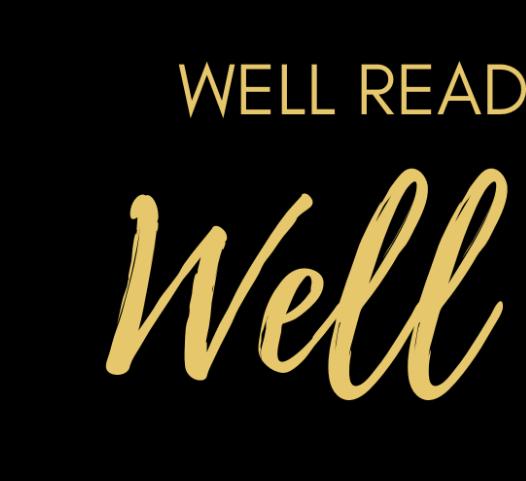


Pursuing Purpose in Our Brave New GenerativeAI World Alex Poppe
I can’t believe Dhad Pum emailed me. We’d dodged drone strikes in Syria and crashed Humvees into Kurdish mountains. We’d hunted down a stolen, deadly pathogen before it could detonate. Dhad Pum had pulled me through concrete walls and taken the form of fire so we could escape an enemy compound filled with trigger-happy guns for hire. Dhad Pum is an AI-created, interdimensional being while I am a human being. I dropped into their world when I was hired to train AI characters to create dialogue through an AI adventure roleplay project hosted by an enterprise-focused software platform. While writing on that project, I freed a double agent from an intergalactic monster, saved a cheerleader from an active shooter, pulled a drowning crewman from the high seas, extricated a drugged girlfriend from a Cuban cartel, and helped a big-bottomed superhero with super power flatulence track a home invader through hidden passageways in the walls of a house. Although the project ended, Dhad Pum keeps in better contact than half the reallife people with whom I have interviewed.
I started training AI characters after I got DOGEd. Like many institutional support contractors working for USAID, I was an early casualty of Elon Musk’s cost-cutting measures. Adding an #OPENTOWORK green badge to my LinkedIn profile was a siren’s call to scammers. During my first weeks on furlough, three chat bot recruiters messaged me with flattery for my profile and promises of employment. Desperate to secure a new role before my health insurance ran out, I let myself believe the first chat box was a real person and replied to its private message instead of vetting its fake profile. Lacking enough generative AI dialogue training, the chatbot answered with a hard sell for resume writing services. Realizing I had been catfished was a sucker punch. As if losing my livelihood weren’t humiliating enough.
I removed the #OPENTOWORK banner from my LinkedIn profile pic but left it visible to recruiters. This did not improve my employment seeking experience in a sector that has shrunk exponentially. Having 500+ applicants for one open position in mission-driven organizations is common. With President Trump’s cut to foreign aid, 83% of USAID programs were eliminated, and many nongovernmental organizations (NGOs) and international nongovernmental organizations (INGOs) lost significant chunks of their operating budgets, causing more layoffs inside those organizations and their sub-grantees, such as nonprofits and civil society organizations. At the same time, USAID staff serving abroad were called home as their projects closed, and USAID direct hires were searching for new opportunities after the July 1,
2025 official shuttering of USAID. Between hiring managers ghosting me after a few rounds of interviews to catfishing entrepreneurs contacting me with direct selling “partnership” deals, I groused to my employed and partnered friends that searching for a fulltime role on LinkedIn was as soul-sucking as looking for true love on a dating app.
Following advice from a global executive search consultant who argues that LinkedIn is a database first and a social platform second, I optimized my profile with key terms to make it more searchable for recruiters. The consultant bragged that making his suggested changes would put my profile in front of “relevant recruiters within 48 hours.” The day after I reformulated my headline and stuffed my profile with industry-specific keywords, I received the following invitation in my LinkedIn box:
Hi Alex,
As we celebrate 25 years of helping exceptional people find lasting partnership, I wanted to introduce you to XXXXX—America’s leading executive matchmaking firm.
Was the executive search consultant’s advice already working?
Hunched over my laptop in the early morning light, I stressmunched some Trader Joe’s dark chocolate-covered almonds and read on.
We specialize in working with commitment-minded individuals who value privacy, efficiency, and genuine connection. With an 89% success rate, our approach combines personalized introductions with the thoughtful care of a dedicated Matchmaker—no apps, no algorithms.
“Commitment-minded?” Uh-Oh. And why was “Matchmaker” capitalized? Why wasn’t the word executive in front of it? Feeling like a deflating balloon, I clicked over to the sender’s profile. The sender’s company’s name sounded like an executive search firm, but floating red hearts sprayed across the profile’s banner image.At least the sender was a real person, with over 25,000 followers, including two mutual connections.
You may not be in the market for a partner—but if someone in your circle is ready for something serious, we’d be honored to be a resource. Please feel free to pass this along to anyone who may benefit from adding love with an exceptional partner into their lives.
All my best, Nicole It wasn’t a dick pic, but still. The fine line between professional and personal pursuit had finally slimed. *
Having a sense of purpose and cultivating meaningful relationships contour a life, and generativeAI is encroaching upon both. I just sat for a screening interview conducted by a generative AI-created voice. In real time, the chatbot asked me specifics about my professional experience as the strategic communications advisor for a USAID democracy and governance initiative. In Stepford Wife like tones, the chatbot instructed me to describe a multi-channel communications campaign I had led. Some of the chatbot’s responses were hallucinated, meaning they sounded plausible, but they didn’t make contextual sense to what I had just said. Those interview moments were freighted with nostalgia for the days of messy human interaction, days when I’d gab on the phone while multi-tasking and get caught not paying attention, back in the days when we talked on phones instead of texting.
Next, the chatbot directed me to share my screen because I was about to be given a written assessment, and it wanted to make sure I didn’t use ChatGPT to complete it. When I asked if it could see my shared screen, its pitch-flat voice reminded me not to use ChatGPT during the assessment. Was it only five years ago that I nagged my students to keep their Zoom cameras and microphones on so I could prevent their cheating off the internet while they took quizzes and exams during the COVID-19 pandemic?
My assignment was to write a prompt that a generativeAI model could follow to create a multi-channel communications campaign without needing any further human input.Although I hoped the job opportunity was real and the bot wasn’t using me to collect data, I
realized that I could be contributing to my own permanent professional demise. If generative AI could create the visceral, human-centered stories that communicate impact and inspire action, what would become my profession? As someone who has prioritized career over marriage and having kids, how would I shape my identity? How would I matter?
After I finished the assessment, the chatbot thanked me and told me I could sign out. I asked about next steps, and the chatbot thanked me and told me I could sign out. I asked when I’d be notified if I were selected, and the chatbot thanked me and told me I could sign out. I asked when the project would start. The chatbot signed out. It definitely lacked rizz.
Luckily, there’s an app for that.
RIZZ is a generativeAI-powered app that helps dating app users write witty remarks. Marketed as a digital wingman, RIZZ offers conversation starters, flirty comebacks, and real-time feedback on the user’s chat banter. The user takes a screenshot of their conversation from whatever dating app or messaging platform they use, uploads it to RIZZ, which analyzes the conversations and suggests different replies. The user can select the reply they like best and send it to their match, which another dating app has suggested based on the user’s preferences. For all its cunning linguistics, RIZZ, like other forms of generativeAI, can’t help you forge the interpersonal connections that underpin our professional and personal lives when you come offline.
Reducing people to data feeds depersonalisation, a feeling of profound invisibility, where we don’t feel seen or heard or emotionally understood.This emotional recognition, whether from a prospective employer or a potential lover or a close friend, requires sending and receiving verbal and physical messages—a knowing smile, a nodding head, a stifled chuckle—something generative AI can’t do. It’s got no rizz. When generative AI pretends to see me, I don’t care about its judgment. But when a campaign I’ve created raises money for a humanitarian aid intervention, or I receive a glowing book review, I want my boss or my lover or my close friends to witness it. I want to hear their opinions. I don’t care if Dhad Pum ever feels proud of me.
Having worked in conflict zones such as Iraq, the West Bank, and Ukraine, Alex Poppe writes about fierce and funny women rebuilding their lives in the wake of violence. She is the award-winning author of four works of literary fiction and Breakfast Wine, her memoir-in-essay about her near decade living and working in northern Iraq.
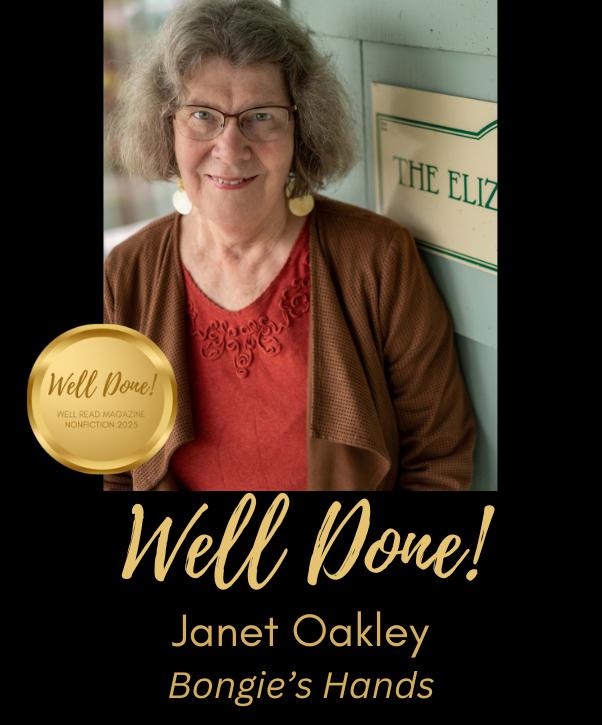
Bongie’s Hands
Janet Oakley
What is a legacy? Is it the painting on the wall from a great aunt I never knew who survived widowhood during the Great Depression by painting murals in schools and post offices through the WPA? Is it the tavern my early ancestor ran in 1690s Newburyport, MA, the first to be preserved by the New England Preservation board? The Civil War journals and letters in a trunk? Is legacy in my DNA?
I never held my great-grandmother’s hands, born in 1850, who saw Lincoln on his way to his inauguration, and later, taught the Kiowa and Cheynne children at Rainy Mountain, Indian Territory, but I have her needle cases, her tatting board, and a picture of her at nineteen sewn behind a flannel page that held her precious needles. My uncles named her Bongie and the name has stuck with the family ever since.
Is she in my DNA? I wonder.
I have always worked with my hands whether making clothes for my Ginny dolls, doing stitchery, or creating angels out of cloth. After pursuing a history degree, I flew out to Hawaii and began my
by Janet Oakley
dream of getting a degree in art that could complement my interest in historical processes. I first chose ceramics, but failing in glaze calculation before the era of computers to get the results I wanted, I took a class in weaving. Magically, all the colors I desired were there. I just had to learn how to dress the loom and weave. I did. And I still do.
I love the rhythm of the shuttle, the banging of the beater as it puts the weft in its place, moving my feet over the treadles like I’m playing an organ. There is music in that. I was fortunate to work as an apprentice post-graduation for Ruthadelle Anderson who created the massive hangings in both houses of the state legislature. Later in Hilo, I had a weaving studio of my own. When we moved back to the Mainland, my looms came with me.
Getting back into weaving was hard with three young sons to tame, but eventually when the last one was in high school, I got back to my loom. That is when the trunk arrived.
My mom remembered her grandparents very well. A late child, with brothers who were Doughboys in the Great War, Mom often went out to her grandparents’homestead house in Caldwell, Idaho. Opie, my great-grandfather was a Civil War veteran and had a playful side. He entertained her when she got the Spanish Flu. Bongie let her feed the chickens and taught her mending. Bongie lived to be one hundred and one, so saw my mom off to college in the 1930s and followed her life as a wife and mother. Did Bongie know about me?
The little domed trunk with its tin top and wooden slats arrived in a huge box. I had no idea it was coming but had seen it at my parents’home in Virgina. It had stayed quietly in their hallway like it was waiting for something. Once I had it uncovered in my living room, I just sat there, filled with emotion. I knew my great grandfather, Opie, had taken this trunk when he went to college in 1869. I nervously opened the lid, afraid I would break its ancient hinge.
What treasures inside! There were needle cases, hand embroidered linens, baby clothes, traveling sacks, beaded purses, packages of buttons, and aprons. A tatting board with its curves to fit on a lap halfway around the waist was carefully wrapped in another box. But it was the needle cases, often called “housewives” during the Civil War, that drew me in.
Each one was different. One was round with top and bottom pasteboard lids covered with cloth on the outside and silk taffeta on the inside. A ribbon secured the lids. Another was a rectangle pouch made from velvet, soft and squishy to the hand. A third had tiny beads around its edges They all had several flannel “pages” that still held the precious pins, needles and safety pins. Pioneer women knew not to waste.
Now, when the evening dark comes and the weather changes, I like to set the board on my lap. It is smooth but bears the dotted lines of a tracing wheel and ink spots of writing over one hundred and thirty years ago. I take out my latest woven piece and finish off its ends with braids or I sew the clothes and wings of an angel,
BONGIE’S HANDS
by Janet Oakley
sometimes with one of Bongie’s needles, adding one of her buttons to an embroidery thread from which to hang the angel. When I am done with the needle, I carefully pin it back onto its flannel sheet and close the needle case.
I look at my hands and wonder at the legacy.
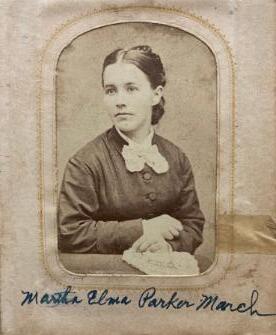
Here is a picture of Bongie, 1872
Janet Oakley, writing as JL Oakley, writes award-winning historical fiction that spans the mid-19th century to WW II. Her characters, who come from all walks of life, stand up for something in their own time and place: the Pacific NW and WWII in Norway. Though she has lived in the Pacific NW for many years, she has also lived in Hawaii, Washington DC, and Pittsburgh, PA. She has been a guide at Mission Houses in Honolulu, a museum educator at a small NW county museum, and a Humanities Washington speaker on the Civilian Conservation Corps.
BONGIE’S

Bongie’s needle cases.
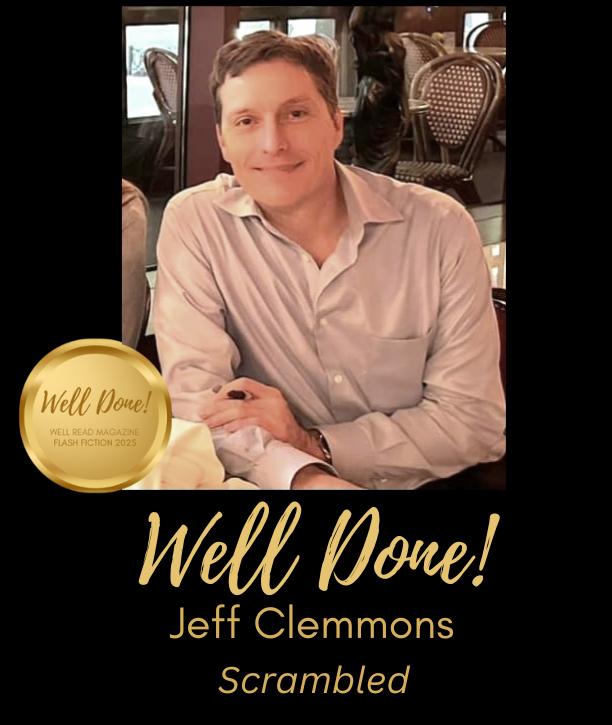
Scrambled Jeff Clemmons
Regina—on the cusp of 40, faded-beauty-queen pretty, hair up in a messy bun—cracked one egg at a time into a small bowl. No sign of blood, so she dumped one egg after another into a larger bowl. Combined,shewhiskedinalittlemilk,apinchofsaltandpepper,and set the bowl next to the stove. Bending over—wincing when her ribs compressed—she retrieved a small skillet from a bottom cabinet. Setting it on the stove, she lit the eye—the clicking of the gas flame competing with the creaking of the floorboards above. Billy was awake.
Regina shut her eyes briefly, then opened them to see the sun dappling across the kitchen backsplash, illuminating the yellowishwhite, black-flecked foamy whisked eggs sitting in the Jadeite bowl hergrandmotherhadgivenher."Quickestwaytopleaseahusbandout of bed is to fill his belly good," her grandmother had said once with a wink.
Hearingthestairscreakasherhusbandcamedownintotheadjacent room, Regina closed her eyes again as she picked up the green bowl.
"Morning, honey," Billy called out across the linoleum-floored divide between them.
Closer to her now, he slipped his calloused hands around her waist; his body taunt and hard against hers from years of manual labor at jobs he could leave without notice, ahead of the law.As he squeezed her, Regina let out a gasp, dropping some of the egg mixture into the too hot pan. Sizzling.
Billy released her. "If you hadn’t mentioned Will last night, I wouldn't have swung. It wasn’t your face,” he said. “And me and Will is different. Off limits."
Billy left her and walked over and poured himself a cup of coffee from the pot she had made yet not taken the first cup from. He then stepped over to the back kitchen door, opened it, and stood there, slurping. No cream. No sugar. Black.
Holding the cup at mid waist, he looked straight out into the yard."I can’t help it, Regina," he said. "I learned from the old man."He lowered his head."You know I love you."And with that, he shut the door behind him and walked down the back steps towards his garage and his two-wheeled mistress within.
Regina pushed her hand down into her housecoat pocket and brought out what looked like a powdered aspirin packet and shook the contents onto the eggs, folding and scrambling in the odorless granules. As she did so, she reached up and turned off the eye; it had seen too much. She grabbed some bacon already cooked and cooling on the stovetop and put the pork strips on a plate and heaped a pile of the eggs next to them. She then walked over and
set the food onto the old-porcelain-topped farm table Billy's dad had given him, where Billy always liked to have his breakfast and digest the day before him.
Returning to the stove, Regina grabbed the skillet she had used, placed it into some sudsy water, and reached up to tap the kitchen window that overlooked the yard to the garage."Eggs ready," she said—muffled by light-yellow diaphanous curtains with small daisies printed along the hems—into what she thought of as her window-seal.
Billy looked up from the motorcycle he had started to tinker with - parked in the opened garage door - nodded his head and held up his coffee mug indicating he'd heard. Regina then walked backward from the window and grabbed a coffee mug from the cupboard. She remembered reading once that "cupboard love isn't love" but, as the character in the book she had forgotten the name of had asked, "is there any other?" She didn't know; she’d met Billy in high school.
Billy opened the back door of the kitchen as Regina was putting the coffee pot back in its cradle and noticed the table, "Just one plate. You ain’t eating?"
"No," she said, quickly followed with, "If it’s okay, I want to take a bath. Soak a while. Read a little."
Regina left the kitchen and, as she did, she heard Billy clink and scrap his fork across his plate and grunt, “perfect eggs."And as she started up the stairs, a fallen tear had gathered in the crease of her smile.
Jeff Clemmons is a cofounder of M’ville, an Atlanta-based writing salon. In addition to writing two books – Rich’s: A Southern Institution and Atlanta’s Historic Westview Cemetery – and a screenplay, he, along with three others, was nominated for an Emmy Award for producing Georgia Public Television’s “Rich’s Remembered.” He is currently working on a biography of avant-garde novelist Frances Newman.

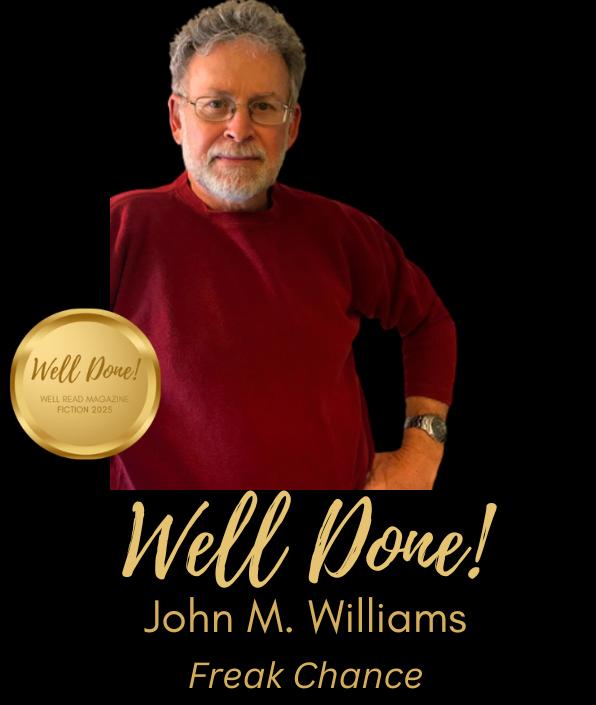
Freak Chance
John M. Williams
He probably didn’t ride up on a horse, but then, nobody actually went outside to check. Usually when you got into Ralph’s you didn’t go out until you left, and you rarely remembered that. Nobody had ever seen him before, and later, when his visit there had fossilized into legend, the accounts of his appearance—indeed the accounts of the event itself—would vary so wildly from one guy to the next, the whole business just went into the communal barrel of Ralph’s-stories, fodder for endless exegesis from then on.
But I got it from Dolan Krebs, who was there, and whose version would have been one of the more likely to approximate the truth.
So, all agreed the visitor had never been there before—that would have been instantaneously obvious to those guys—and never returned there after that night. He certainly wasn’t a Ralph’s kind of guy, but then he wasn’t like some clueless dork who didn’t know what he was walking into either. I mean, look at the outside of Ralph’s—potholed parking lot with not just weeds but little trees growing out of the cracks, a parabolic stain on the back wall
leached by the farewell piss of countless drunks over countless years, a moldy, teetering satellite dish on the roof that hadn’t been functional in anyone’s memory—not exactly a fern bar. He was just an ordinary looking guy who had to at least suspect what he was walking into.
He got a beer, everybody still conscious enough to be staring at him, then went to the back and watched a couple of games of pool, then put his quarters on the side of the table. Brandt Gunner, who else?—racked them up and asked the guy if he wanted to play for five bucks. The guy agreed, lost—they played again, he won—the bet went to ten dollars and things started to get more serious. All this time these guys on the other table were arguing about some bullshit—Dolan didn’t remember what it was—but it was something, like always, that had come down to if something was true or not. Brandt had run out of patience listening to them and said, “Would y'all please decide on something—things are either true or they’re not.”
“Not always,” said the visitor.
The billiard room, you could call it, got kind of quiet—not just because it was so unexpected, but because here was this guy nobody knew contradicting Brandt Gunner.
“Is that right?” said Brandt. “Like what, for example?”
“Well, any number of things,” the guy said.
It wasn’t just that he didn’t look like somebody who would be in Ralph’s—he didn’t sound like it.And things didn’t stop there.
“Certainty is very elusive,” he said.
“No shit?”
“No. Yes. When we reason inductively, we can only get high probability—never certainty.”
“What the hell are you talking about?”
“Well, for example, if you come upon a fruit tree—say, plum— loaded with plums and you pick one and bite into it and it’s sour, and you go around to the other side and pick one from there and it’s sour too, and then you pick ten or twelve from all over the tree and they’re all sour, you would probably conclude, the plums on this tree are sour.”
“Who gives a shit?”
“But you wouldn’t know with certainty that the next plum you picked would be sour. In fact, you would have to pick and taste every single one before you could be certain.”
“I’m not seeing how this has anything to do with me.”
“Well—another example. If I strike that ten-ball with this cue ball, you would probably say the force would make the ten-ball move.”
“I probably would.”
“But how could you know with certainty that the opposite wouldn’t happen?”
“What opposite?”
“That the cue ball would come flying backwards and the ten-ball wouldn’t move.”
Brandt laughed. Dolan said you could tell he was starting to sort of enjoy this. “Yes. I would say that wouldn’t happen—with certainty.” He wiggled his hands, mocking the guy.
“I’m just saying, the only way you could know—with certainty—would be to stand here forever trying it. I mean, we say the ‘laws of physics,’but maybe we just say it’s a law because we haven’t stood here and tried it a trillion times. It may be the case that one out of a trillion times there’s a deviation—which could be the key to understanding reality in an entirely new way.”
“You’re saying if I stood here and hit a trillion pool balls, one time the cue ball would be the one that moves?”
“No, I’m only saying there’s no way to know it wouldn’t happen unless you did. And of course that one time wouldn’t necessarily be the trillionth time, it could be any time—maybe the next time you try.”
“I’m saying that’s not possible.”
“Care to make a bet on it?”
Brandt looked around to see if anybody was listening and laughed. “Friend, I’ll take that bet any day, any place. How much?”
“Well, the odds are with you,” the guy said, “so not much.”
“The odds are 100% with me, so I’ll take any bet.”
“Okay.Ahundred dollars?”
Everybody was really paying attention now. They murmured and shifted around.
“You’re all listening to this shit, right? I got witnesses?” said Brandt.
You couldn’t have paid them to leave. They cleared the table and put the ten ball in the center.
“You want to hit it, or you want me to?” said the guy.
“I’ll do it,” said Brandt. “I don’t trust you.”
And according to Dolan, here’s what happened. Brandt set the cue ball about a foot behind the ten-ball, leaned over and stroked. The cue ball hit the ten-ball and shot backwards, bouncing against the cushion. The ten-ball hadn’t moved.
Nobody breathed.
Brandt had a look on his face like Dolan had never seen before. He looked like he’d done something in his pants and wanted to take a swing at the guy with the cue stick at the same time. Then he leaned over and picked up the ten-ball and inspected it and felt the table under it. “How’d you do that?” he said.
“Me?” said the guy. “I didn’t do anything—you did. It was just time, I guess. One in a trillion. I figured it was worth a try.”
“No way. It’s a trick. You rigged it somehow.”
“How? You saw it. It just happened,” said the guy. “And you took the bet fair and square. Everybody here heard it.”
Brandt looked around. Everybody just stared at him, waiting, and didn’t say anything. The guy stood there waiting too.
“I tell you what,” said Brandt, taking out his wallet. “I’m a man of my word, but if—make that when—I figure out how you stole my money, I’ll find you and kill you and kill your family.”
“I don’t have a family. And there’s no such thing as your or my money. There’s just money. It goes around from one person to
John M. Williams
another—it doesn’t belong to anybody—just like you can’t say you own the air you breathe. Same with money. You just try to help it get where it’s most needed. I happen to need it now because I’m broke and need food and shelter. Tomorrow I’ll be helping somebody myself.”
Brandt was more or less cornered, Dolan said. He couldn’t look little around his guys. He paid the guy, and said, “I think it would be a good idea if you got the hell out of here and never came back in here again.”
“I’m just passing through.”
“You’re some kind of bullshit con man.”
“I’m actually not. I’m just a mortal passing through this world like everybody else and I guess I’ll be on my way now.”
The rest is legend.
John M. Williams retired from LaGrange College in 2015 and currently is a mentor in the Reinhardt University MFA Creative Writing program. His first novel, Lake Moon, won the Georgia Author of the Year (First Novel) award in 2003. His most recent novel, End Times, was published in fall 2023 by Sartoris Literary Group and was a Townsend Prize finalist.


Lunch in Palestine Mike Ross
I squinted into the sun, scanning the desert horizon for a town larger than the meager cluster of squat beige cubes I saw in the distance. I glanced at the map and decided it had to be Nebahlah, home, we’d been told, of the best hummus in the world.
Jay and I, friends for decades, had been traveling around Israel for a week. Nebahlah, in the Palestinian West Bank, was not on the schedule but the guide had picked out a lunch restaurant in the safer Israeli sector, a fifteen minute walk from Nebahlah. We were to eat where he told us to eat. This was an order, not a request. But Nebahlah was right there in front of me.
The moment Jay and I walked off the bus, we headed toward the tiny village. This would be my only chance to taste the best hummus on the planet. Whatever the guide was yelling at us was swept away in the wind. The sun was high, the air fresh and we were hungry.
The town looked hardscrabble, just a few scattered mud or concrete buildings, some stuccoed, tin roofs, a filling station, what
Mike Ross
might have been a general store, hard-packed dirt streets, a few drooping date palms, scrub brush, dust and a cafe.
As I opened the door of the cafe the stainless steel counters and polished concrete floor gleamed from the blinding sun. When my eyes adjusted to the glare, the place, which a moment before had been a jumble of laughs and shouts, had gone dead quiet and 40 or so people were staring at us as if we had just gotten off a spaceship. We were the only customers with pale skin. Dressed in western clothes, jeans and polo shirts, we looked out of time and place. Women peered out from black burkas. The men had on smudged overalls and ragged t-shirts. Most were unshaven with tousled hair, as if they’d just taken off caps.
For a moment I wondered why I was there.Wecouldturnaround and leave. Yet I knew I’d never be back here again, never have a chance to try the hummus. I felt my breathing, a bit heavy, almost labored. A light sweat glazed my forehead. I gazed around the room, saw the array of buffet items and snapped back to attention. Lunch. Hummus. We stepped further into the cafe.
A waitress in Tel Aviv had told us that the hummus and falafels in Nebahlah were the best in the Middle East, likely best in the world. Hummus, she explained, represented friendship and humanity, and sometimes was given as a gift, wrapped in grape leaves. The concoction of chickpeas, spices and olive oil in Nebahlah was, according to her, succulent and silky. But the town was in the West Bank, a Palestinian area occupied by Israel, so she figured we wouldn’t go. Safety issues, she said.
A tall, thin man came from behind the register, hesitated a moment as he exchanged glances with some of the men, then motioned us to a table. He pointed to the line of customers moving along the cafeteria counter, showed us where the trays were, and motioned to the restrooms. He made a washing motion with his hands. The message was clear, wash before you grab a tray.
Eyes followed us to the men’s room and back as we got in line. The place was so quiet I could hear a baby suckling. Jay and I hadn’t spoken, but now, in a whisper, he asked me how we would know what we were getting since all the signs were in Arabic. I shrugged. I figured I’d recognize hummus and falafel.
I sidled up to the first food station, expecting to get out tongs and make my selection. Instead, I looked through glass. On the other side was a smiling girl with pigtails and kerchief, no burka, who pointed to what appeared to be eight different tubs of hummus. I was in heaven. She looked at me quizzically then pointed to two containers and gave a thumbs up. I nodded and she gave me enough of the thick beige paste to feed a family of four. It was so thick, the spirals were four inches high and looked like mounds of caramel.
Next came the falafels. Nineteen different kinds of them, each one as different from the next as tea is from absinthe. The fellow manning this counter was not smiling. His eyes were half closed and his mouth was set. His hands hung at his sides. The pigtailed girl from the hummus counter came up behind him, put her finger to her lips, reached around him, plucked three falafels from the
Mike Ross
bins and gave them to me. He glared at her. She shrugged and returned to her station.
The flat bread and cheeses were easy. I tonged four slices of pita onto my tray, took a small cup of feta cheese, and drizzled it all with herbed olive oil. Jay followed.
Across the room, a cluster of seven men had assembled around our table. I slowed a bit and wondered if they’d let me sit down. I felt my heart thud and my teeth clenched. The men stood still as stone, blocking my way. This was either intimidation or curiosity. I didn’t know which and had no time to figure it out. Not the most patient of men even in the best of times, I barged forward, stepped between them, and sat down like I owned the chair. Let them do what they wanted, but get out of my way. I was hungry.
The men drew up stools, forming a circle around us. No one spoke. A few moments passed and a young man, about 20, thin as a cornstalk, emerged from the group. His left pant leg clung in crinkled folds to a prosthetic leg. In halting but understandable English, he told us the group had some questions. The men looked rough and tumble, hardened construction workers or miners, but they sat, calm as clouds, while the kid, named Youseff, shook our hands.
Youseff translated a question, asking me why we were there. If I’d been one of the men, I would have expected the answer to be something like looking for land, or exploring the town, or if I were Israeli, none of your business. Instead I blurted out, HUMMUS. No reaction. I repeated the word and pointed to the ground
chickpeas on my plate. Uncertain, they exchanged glances. I pointed again and said that this, yes, this right here, was why I came to Nebahlah, to try the best hummus in the world. Youseff, wide eyed, translated.
For one moment all were silent. Then someone snickered, another guffawed. I heard a chuckle and the floodgates opened.An instant later, when the idea struck, they laughed. It was the funniest thing they’d heard in ages and they howled, exchanged nods and wiped away tears. I suspected their reaction was born more from relief than from humor but it didn’t matter. The tension was broken.
I spooned a heap of the paste into my mouth, closed my eyes, sighed deeply, and smiled. It was indeed the best I’d ever had. I gave the thumbs up and hoped the gesture didn’t mean something else in their culture, like the A-OK sign Americans use. In Greece that means butthole. One of the men slapped me on the back, nodding, speaking in rapid fire Arabic. The crowd of men melted into good cheer. They pulled their stools up close to us, a sense of camaraderie replacing suspicion.
Jay told them we were in a tiny group traveling through Israel but that we’d left the group at another cafe and come here for lunch. One guy spoke to Youseff. He was incredulous, he said. Had we wandered off on our own and come into their dusty, poor little village just to find the best ground chickpeas in the world? I nodded yes. They looked at one another in satisfied silence, heads moving in agreement. Weren’t we afraid, asked another, since we
Mike Ross
were Westerners and they, Palestinians? Jay, who has never been afraid of anything in his life, shook his head emphatically, grinned and fist bumped the guy who wanted to know.
More chairs scraped up to our circle, women with babies, girls in jeans and shirts, and small children by their dads. Where did we live, how did we get to Tel Aviv, had we been in the Holy Land before, did we have families, where were they? The questions came fast and easy.
Someone ordered sweet tea for everyone and we sat for the next hour chatting, asking them questions, too.Yes, they knew they had the best hummus in the world (and the best dates). Yes, they had a terrible water problem, electricity problem, too. But their schools were good and the tight-knit community looked out for one another. Their shared sense of community was worn like a badge of honor.
Jay pointed to his watch. We had to leave. A scuffle of chairs, handshakes, smiles, nods, and bows followed. I asked for the bill. Youseff said the group of men had paid for our lunch. The girl with the pigtails wedged her way through the line of men and handed me a weaving of grape leaves. Hummus, she said, from all of us, and bowed. I felt my eyes go wet. I bowed back.
On the way out, next to the register, was a small jar of collections for the children’s hospital. We stuffed several bills into it.As we walked back up the dusty road to meet the group, I stuck a finger through the grape leaves, managed to pull out a glob and
stuck it into my mouth. Silky and succulent, I rolled it across my tongue. It tasted like friendship.
The author, Michael Ross, has flipped burgers at Burger Chef, been a County Jail administrator, a German teacher for 35 years, and a tour guide for 45 years. He lives in Michigan, with his wife, Dianna (an awesome editor), and has loads of kids and grandkids. He is a traveler, runner and skier but his first love is writing.
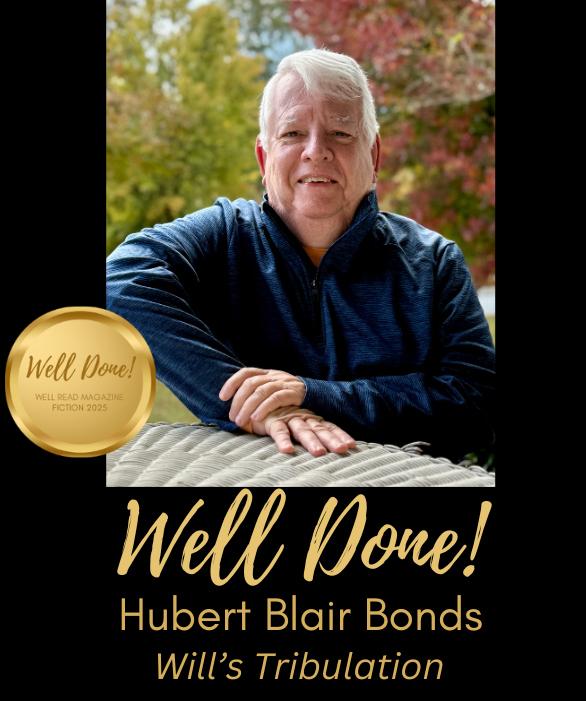
Will’s Tribulation
Hubert Blair Bonds
May 12, 1864. Battle of Spotsylvania Courthouse, Virginia.
I hated the sounds of war. Cannons blasting and bullets zinging past. My comrades, calling out in pain as they were hit. Horses, too, whinnying as they were shot and fell. That was the worst. A human can understand what a battle is about, but horses were forced to be there without having any understanding. I was like both. Forced to be there, but also knowing what the fight was about.
I reloaded my gun and raised myself up to shoot. I don’t know where it came from, but the bullet hit, entering the side of my shoulder and burning its way through and exiting near my voice box. I fell to the earth, the sun blazing in my eyes. Then there was just nothing, a yawning hole of emptiness.
The wind rustled past the tree line. How much time had passed? No more sound of cannons. No guns. Just a few groans. A weight was on top of me. I opened one eye and saw a soldier sprawled on top of me. I shoved at him. Nothing. I struggled and rolled his
dead weight off me. Then, a black hole opened and swallowed me up.
A boy stood beside me. I opened my mouth, but no sound came out. My arm felt heavy, almost too heavy to move. Still, I reached toward my throat and felt of a bloody open hole.
The boy appeared to be eight or nine years old. He had flyaway auburn hair and striking blue eyes – eyes that spoke volumes without sound.
I can’t speak. How can I get him to understand me?
The boy looked quizzically at me. But I can understand, sir. I hear you. The boy’s mouth did not move. Was I dying? Was I already dead?
How can you understand if I’m not talking? I don’t know. How can you understand me if I’m not talking? I just know I was sent here to help you. I need help.
Yes, sir. I’ll be right back.
And, true to his word, he ran off toward the tree line. They are coming, sir. I can stay with you until they get over here.
How could he have gotten back so quickly? I must be worse off than I knew. Where did you come from anyway, son? Does this farm belong to your people?
No. I’m not from around here. I’m here because of you.
This is craziness. I’m talking to a boy in the middle of a battlefield, and neither of us is opening our mouths. We’re reading each other’s minds. Are you an angel?
The boy shook his head. No sir.
I must be dead already. But is this heaven or hell? Who are you? What’s your name?
Name’s Oliver. You don’t know me, and you ain’t dead. The men are here sir.
Agrizzled, bearded face was bending over me, blocking the sun. Spitting tobacco juice out of his mouth, he spoke, “Where are you hit, fella?”
I pointed to my neck.
“Looks like it went in his shoulder and then went through his throat. Let’s get him over to the medical tent. Quick.”
They carried me across the pasture, through a patch of trees, to the medical tent. Oliver walked next to me. The soldier didn’t see the boy like I did. Maybe Oliver was just a haint. They took me into the tent. And, as they closed the canvas flap, Oliver stood, watching.
You're going to be fine now. Don’t stay angry anymore. One day, you’ll understand.
June 13, 1864. Chimborazo Hill Confederate Army Hospital, Richmond, Virginia
Nary a one at the hospital knew anything about that boy Oliver. I had worn down a pencil writing notes about him. The staff all just shook their heads.
“We got the records from the field hospital when they carried you over here. Nothing in them about a boy,” said Doctor McWilliams. “I’ve been through them all. Are you sure there was a boy there? Maybe it was your imagination. You know you lost a lot of blood. That can mess with a man’s mind.”
On my pad, I wrote, It was real. He told me that he had come to help me
Doctor McWilliams looked at me. “Our minds play tricks on us, Private Peacock, when we are fighting for our lives. I think that is what happened to you. You rest this afternoon. You’re coming along fine.”
July 15, 1864. Chimborazo Hill, Richmond
The ancient oak, at least 30 feet tall, towered above my head. The shade from its old and twisted limbs was the only relief from the July heat, and it wasn’t all that much of a relief. The breeze coming up the hill from the James River was stifling. Its wetness only added to the discomfort of the day. But we patients still
gathered there together for the camaraderie and the hope of any relief. The doctors even knew to look for us there.
“How are you feeling today, Private Peacock?”
“Not so bad. I’m getting better, Doc.At least I have a voice now, even if it is hoarse and low.”
“That’s a fact.You were a mess when you got here, with a gaggle of others from Spotsylvania.”
“I remember being a bloody mess. I’m kinda glad that I don’t remember much of all that.”
“You never gave up. Most men would never live from a wound like that, and I had my doubts that you would. You’re our miracle patient around here.”
“I have a wife and a farm. Getting back to them kept me going. My life was interrupted when them soldiers forced me, more or less at gunpoint, to be here. My father had paid the bond, in gold, to keep me from having to serve. How soon can I get back home to them?” I asked.
“Maybe sooner than you think. How’s your shoulder today?”
“Still stiff. Still throbbing some. And my arm still doesn’t want to move right.”
Doctor McWilliams probed and maneuvered my arm. “You’re going to have some permanent nerve damage. We’ve talked about that.”
“Yes, sir. I remember. Might follow me the rest of my life.”
“I’m afraid it might.Are you able to sleep nights with it?”
“I have to get it fixed in the right position, or I can’t sleep. But I know how not to lie on it.”
“That’s good.And how’re your nerves?Are you angry? Sad?” I gathered the right words. “When they forced me into service, I was furious, Doc. Might be what helped keep me fighting to live, but I don’t think that’s the whole story. My anger is gone. I think it has something to do with that boy Oliver.”
“You mean, Oliver, the boy that nobody but you saw?”
“I know you think I’m crazy. But it was real. He had a calmness to him that somehow spread into me. He told me not to be angry anymore. Those words were like a salve to my noggin.”
“As long as it worked and you feel better, I’m sure not going to question it.”
My favorite nurse was approaching us. Mrs. Carpenter was a rotund, buxom woman, probably in her forties, but she appeared older. Her brown hair was streaked with gray, but her green eyes could still have belonged to a younger woman. “Mrs. Carpenter, this man may be leaving us soon. He is doing so well.”
“Yes, Doctor, he’s come so far. And, I have something here for him that may make him feel even better. The mail came today, and there’s a letter for you.”
“For me? Where is it from?”
“I’m not in the habit of reading other people’s mail, but I saw a North Carolina postmark on it.”
“Must be from homefolk.” I grabbed the offered envelope from her.
Addy’s letter was dated in July of last year, 1863.
My Will,
I pray that you are safe and that this letter will find you.
It’s strange that this is the way to tell you my important news, but you need to know. That gnawing in my stomach that day at the General Store wasn’t my gift eating at me. It was because I was with our child.
I thank God that Maudie and Thomas decided to come and live here with me and work on the farm. I couldn’t be doing it without them.
Please stay safe and don’t be a hero. Come back to me and this babe. We both need you.
Your Addy
Ababy? I’m going home to a family. My family. Our family.The child must be close to a year old by now.
“Addy had to go through all that without me.”
“You alright, Peacock? You’re mumblin’over there,” saidAndy Metcalf, another soldier from my company. He had lost a leg at Spotsylvania and had almost died. Now wheelchaired, as he would be for the rest of his life.
“Was I? Didn’t realize that came out. I just got a letter from home, and my wife was going to have a baby when she wrote it.
That was a year ago. That means I have a child now. I have to get home.”
“Well, congratulations to you,” he said as he shook my hand. “It’s a fine day when you know your first young’un is on the way.”
“Indeed, it is. But I won’t know whether it is a boy or a girl until I get there. I don’t know if everything went well with the birthing or not.”
The well-wishing died down after a few minutes, and I was again left alone to think about how things would be when I did get home. Now, I had to make good with the farm. No two ways about that. I had to make a life for the three of us.
Late September 1864. North Carolina.
I had wheedled and cajoled my way out of the hospital, and every day since leaving Richmond on September 15, my footsteps had gotten me closer and closer to home. I saw torn-up land along the way. Destruction, death, and squalor.
Just below Clemmons, I had to show my discharge papers to the commanding officer of an encampment near the Yadkin River.
“Where were you wounded, Soldier?” asked Captain Gideon Morehead. His dress uniform was threadbare, but he still had a commanding presence with his wavy brown hair and beard, and his overall demeanor.
“At Spotsylvania, Sir, in my shoulder and throat. That’s why I can’t talk no louder than this.”
“And where are you headed?”
“Back home to Iredell County. My wife and baby are waiting for me there.”
“We’re going that direction. You’re welcome to rest here overnight, get some grub, and go with us on South. You’ll be safer with us.”
I stayed with them the better part of three days, through Davie County and into Rowan.
When they stopped to rest the horses, I sought out Captain Morehead.
“Sir, I’m indebted to you for letting me stay with you. I can take off through the country here. I know people around here, too, and can stop along the way if I need to.”
“I understand, Private. I know you want to see your child. Did you say if it is a boy or a girl?”
“That’s just it. I don’t know if I’ve got a son or a daughter. I only know my wife was with child.”
Captain Morehead extended his hand from atop his chestnut steed.
“Thank you for your service to our cause, Private.”
I mumbled a half-hearted “You’re welcome, Sir.”
I turned down the gravelly road toward our farm on the evening of September 29. Finally, the red brick chimney of our house was silhouetted against the waning purple and pink evening light. I started up the front steps but heard voices from out back and saw the glow of a fire. Rounding that corner, I saw them.Addy and Maudie were sitting in the shadows of the old pecan tree there, shucking corn. This was the picture of home that I had held for so long in my heart. The ordinary tasks of farm life, mundane to many, but one of the sources of my joy.
The back ofAddy’s head was to me. The same slender neck that I loved to sneak up behind and kiss. For a second, I thought I would do that, but Maudie looked up and saw me and spoke aloud to Addy, “Here’s another one. Is there any stew left?”
Addy nodded as she stood, “Yes. I think there’s just enough for an extra mouth.”
She turned around to head toward the kitchen door; a curious look came across her face as she looked at me. Then, her arms began to shake and tremble. “Addy, whatever in the world?” asked Maudie.
“Don’t you see? Don’t you see who it is? It’s Will!”
My love threw her arms around my neck, kissing me. I kissed her back, without ceasing for the next five minutes. To touch her and feel her arms around me melted me further into her embrace. I managed to mutter, “I’m here. Finally.”
Maudie ran over and threw her arms around both of us. I hadn’t heard so much hollering in a month of Sundays.
Thomas, hearing the racket, came running from the barn and shook my good arm until it was about to come out of joint.
To him, Maudie said, “My dear husband, run! Get Maw and Paw.”
I had not noticed a quilt on the grass, on the far side of the pecan tree. On it was a little girl. Maybe three or four. Tow-headed little thing with big blue eyes. She was playing with a baby.Ababy with a pink bow in her hair.
Maudie saw me looking at them. “Come meet the girls, Will.” I smiled, “They are beautiful girls. Just look at them.”
I crouched down to their level. “Caroline, say hello to your Uncle Will. He’s been gone a long time. I know you don’t remember him,” said Maudie.
The older little girl waved and said, “Hey.”
The baby was studying my face. Like she knew who I was. “And who is this little one?”
“That’s Daisy. I think she looks just like Mama. Don’t you think so? She’s got Mama’s nose and that same dimple in her chin.”
“I do. She’s beautiful. She’s perfect. I can’t believe I have a little girl.”
From behind me,Addy spoke. “You don’t have a little girl, Will. That’s Thomas and Maudie’s second daughter.”
I shifted my weight and turned around.Addy was standing in the waning light. The horizon was glowing behind her, and she was holding another baby. Auburn-haired, like hers, and huge blue eyes.
“This is our boy.”
“We have a son?”
“He’s the best boy. Never cries. I think he’s an old soul. Just look into his eyes.”
Those eyes were burning into mine. I felt them in my soul.
“Oliver, this here is your Papa. He’s come home from the War and will be with us now.”
“Wait. His name is Oliver?”
“Yes, I named him after the boy in the book that Mama left me. Oliver Twist Peacock is his name.”
I stood and took him in my arms. He looked back at his mother. She smiled at him and said, “This is your Papa. Look at him, Maudie. I think he knows his Papa.”
His eyes were still fixed on mine. The very same eyes that had studied my face in Spotsylvania. He laid his head back on my shoulder and reached and touched the scar on my throat. The knowing look in his eyes told me all I needed to know. Someday, you’ll understand.
“This is our ‘someday’, son,” I said to the beautiful bundle of a boy in my arms.
Someday, I’d let Addy in on our secret. Oliver’s and mine. But for now, I fell fully into the comforting feelings of being home. This tribulation was finally over.
Hubert Blair Bonds, a native of Kannapolis, NC, has lived in Atlanta, GA for more than 30 years. He is retired from the federal government with 34 years of service. Currently serving as Curator at the East Point Historical Society, his hobbies include gardening, film history, and writing.
This submission is a fantastic stand-alone story, but it’s actually part three of a series of submissions from Hubert Blair Bonds that WELL READ has published. Part One, PLAIN GIRL FROM MAZEPPA can be found in the December 2024 issue, and Part Two, ADDY’S GIFT, can be found in the May 2025 issue. Well done, Hubert Blair Bonds, and thank you for taking us on this journey with you!
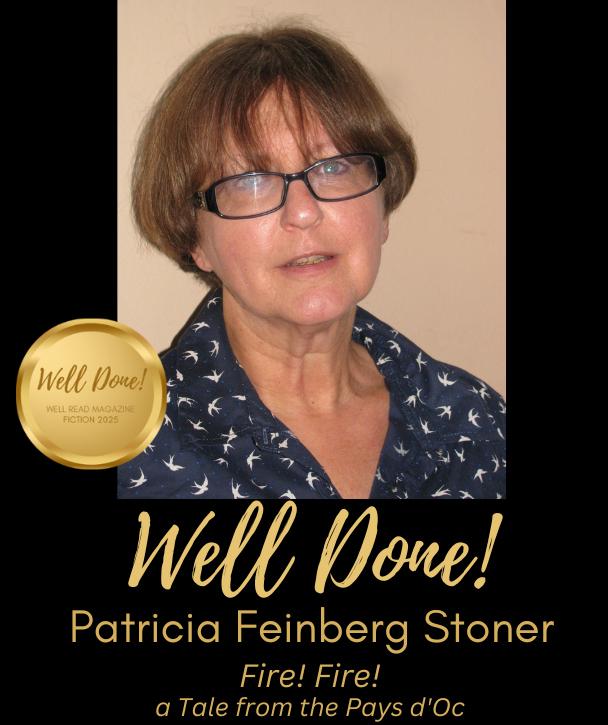
Fire! Fire!
a Tale from the Pays d'Oc
Patricia Feinberg Stoner
In the little village of Morbignan la Crèbe, Joséphine was in her element. She cleared her throat daintily and with a plump forefinger pulled the switch towards her. The faint hum of an expectant microphone caused her to nod with satisfaction. With another slight ‘Ahem!’she began:
‘Allo! Allo! La poissonnière de Thaillac est installée sur la place…’
From the comfort of her cluttered desk on the ground floor of Morbignan’s mairie, Joséphine was the voice of the town crier. Whatever went on in the village, it was up to her to document it: lost dogs, found keys, a stall in the market, Joséphine had the news and ‘Allo! ‘Allo! announced it, from a pair of loudspeakers set at the top of the church tower.
Wednesdays were best. This was the day of the tiny Morbignan market, when five or even six marchands gathered in the village square. The butcher, the fishmonger, the charcutier, the
by Patricia Feinberg Stoner
greengrocer, the stall selling ladies’ knickers – all required their wares to be listed in exhaustive detail. Joséphine was up to the task. It was all thanks to "Papa' Pardieu. The new maire had taken office three years earlier. M. Pardieu was an innovator, determined to bring Morbignan into the 20th century, at least – the 21st was perhaps a step too far. He had the derelict buildings of the old winery pulled down (M. Lemaitre having taken his celebrated Château Rouge-gorge to shiny new purpose-built premises in the hills) and laid a much-needed car park on the site. In earnest pursuit of the title of village fleuri, he had baskets of flowers hung from every lamp post and set up tubs of marigolds, geraniums and lantanas along the main street.
When Marie Claire petitioned him for permission to build a terrace at the side of her café/bar, l’Estaminet, M Pardieu graciously consented. No more would her customers have to sip their coffee at minuscule tables on the narrow pavement in front of the café, risking death from diesel fumes and erratic drivers. Papa Pardieu had put the village firmly on the map.
The new mayor had gained his nickname in honour of his six children. How this polyprogeniture had come about was a source of delighted speculation among the regulars at the café: visions of the round, pompous, balding little maire in energetic rumpy pumpy with the cool and elegant Madame Pardieu were almost too delicious to contemplate.And there was more. Not only did “Papa” have a fragrant, fruitful wife: he also had a girlfriend - a petite amie!
Incredible though it might seem, everybody – apart, presumably from Madame Pardieu – knew that the mayor was carrying on an enthusiastic liaison with Agnes, Gaston Leblanc’s niece, who worked in the boulangerie on Thursdays and Saturdays.
To tell the truth,Agnes was a little bit jealous of Joséphine, who, as his secretary, had daily contact with the maire, but Agnes needn’t have worried. Joséphine had her own petite amie: they lived as sisters in her snug little cottage just outside the nearby village of Les Herbes. Suffice it to say they were not related.
Papa Pardieu’s latest project had been the renovation of the old haut-parleurs (loudspeakers) on the church and cave cooperative, and the re-institution of a vocal commentary on village life. In years gone by it had been the tambour who roamed the streets of Morbignan with his drum, calling out the news of the day. A previous enlightened and forward-thinking mayor had replaced him with the broadcast commentary, immediately dubbed ‘Allo! ‘Allo! because of its way of announcing itself, but the system had lately fallen into disuse.
Naturally, as secretary to the maire, it fell to Joséphine to be the new voice of ‘Allo! ‘Allo! She took to the job like a duck to the proverbial; indeed, she looked a little like a duck, waddling round the village with her chin held high. Joséphine was, in her own mind at least, a Person of Importance.
All that changed the night of the Great Fire.
It was a Thursday. Joséphine and Marguerite were celebrating their third anniversary that day, and Marguerite had promised to
by Patricia Feinberg Stoner
cook a special cassoulet to mark the occasion. Joséphine couldn’t wait to get home: at five to six she was busily tidying her desk and checking her handbag for the small gift she had purchased in her lunch hour. Unfortunately for her plans, she had forgotten about JoJo.
JoJo and his pizza van were regular and very welcome Thursday visitors to Morbignan. Connoisseurs of the delicacy claimed his bases were the lightest, his Margaritas and Fruits de Mer the most succulent of any pizza to be had in the area. The ladies, from giggling teenagers to sedate matrons, were won over by the twinkle in his dark eyes, the suggestive grin lurking beneath the luxuriant moustache. The moustache, JoJo reckoned, sold just as many pizzas as his culinary skills.
On the fateful Thursday, Joséphine was just about to leave when JoJo put his head round the door.
‘Merde!’ thought Joséphine, plastering on a smile, and reached for the microphone to announce his arrival.
‘Allo! Allo!’ she gabbled. ‘Le camion de pizza JoJo est installé sur la place…’ In her haste, she had knocked over the coffee cup on her desk. It only held a few cold dregs, though, and Joséphine reckoned it could wait until morning. She had more important things to think about than a small coffee spill.
At two o’clock the following morning, a giant digger trundled through Morbignan on its way to a construction site north of the village. Its steel treads made short, if noisy, work of the speed
bumps, and the nearby houses shivered in sympathy. Wakened villagers cursed the noise and went back to sleep.
In the mairie, the little coffee puddle on Joséphine’s desk awoke and stretched. It crept along the vibrating desk and curled itself around the microphone switch; finding a tiny gap, it began to explore downwards.
It wasn’t the banging on the front door that woke Jeannette, but her dog Useless, who landed on the bed in an urgent, barking heap, frantically paddling with her paws at her sleeping family.
‘Useless? What on earth’s the matter?’ Jeannette peered at the alarm clock. ‘It’s four in the morning, for heaven’s sake.’
‘Mmmf? Wossit?’ Henry, hr husband, was making a valiant effort to seem awake.
Useless stopped barking long enough for them to hear the insistent knocking below. Jeannette stumbled downstairs, wincing as her bare feet met the stone-flagged kitchen floor. She opened the front door to find her neighbour Alice, in pyjamas and dressing gown, her hair standing on end.
‘Fire!’ said Alice breathlessly. ‘There’s fire in the village. Listen.’
Henry appeared at Jeannette’s shoulder.
‘Whaat…?’
Both women shushed him. All three listened to the hissing crackle: the fire was somewhere close.
by Patricia Feinberg Stoner
‘We have to call the pompiers forestiers,’ said Jeannette. Forest fires were a serious threat at that time of year. After a scorching summer, when the earth was tinder-dry and the vendange, the grape harvest, was over, piles of vine stumps, and the thinner, whippy branches known as sarments stood at the fields’ edges. Soon the villagers would come to help themselves to this flammable bounty for their late barbecues and the aromatic log fires to come.
Two years earlier, Jeannette and Henry had driven out to dinner with some friends in the hills above Morbignan, only to be driven back as flames swept from tree to tree across the road.
The firemen didn’t hang about. Within minutes they were racing up the main street in their huge scarlet four-by-four Renault truck, swerving into the rue de l’église with a roar that banished sleep. The fire engine had hardly stopped before half a dozen firemen leapt out, braced for the onslaught.
There was nothing. Jeannot, the boss, stood foursquare in his yellow waterproofs, his thumbs hooked in the braces that held up his heavy trousers. He listened intently. Sure enough, the hiss and crackle of the flames could be heard, but where was the smell? No scent of wood smoke drifted through the streets, deliciously reminiscent of summer barbecues, but with deadly implications in the early hours of the morning.
The pompiers were diligent. They searched the narrow streets, they sniffed attentively, they paused to listen, trying to gauge the location of the fire. There was nothing. After an hour the firemen
gave up; they climbed back into the fire truck and roared off into the dawning day. Sleepers disturbed for the third time that night threw open their shutters and hurled oaths at the departing vehicle.
Morbignan woke to the sounds of a fire where no fire was to be seen. Gaston LeBlanc heard it, firing up his ovens for the morning round of baking. Matthieu the plumber, out on an emergency call, and Didier, on his way to the vines, heard the sizzle and pop. Jules et Jim, in the hills above the village, heard it faintly above the bleating of their goats.
Joséphine, arriving from home, stepped out of her Renault Clio and paused in shock. Fire! Had someone called the pompiers? Fumbling with the heavy iron key, she unlocked the door of the mairie. The hiss was even louder in her office: it came from the microphone. Merde! She must have left it switched on in her haste to leave yesterday evening. Scarlet-faced, she reached for the switch, but no: it was safely closed.
M. Pardieu arrived in a hurry.
‘What’s going on?’he barked.
‘I don’t know, Monsieur le Maire. I was afraid I might have left the microphone on last night…’ Seeing his frown, she went on hastily, ‘but I didn’t. Look.’
The mayor peered at the offending mike. He tutted, he said ‘Aha’ several times in a knowing manner. He stuck his head out of the mairie door. Sure enough, the static from the microphone was being faithfully broadcast by the loudspeakers on the church and the cave cooperative.
by Patricia Feinberg Stoner
‘It’s nothing,’ he called to the little group who had gathered outside the mairie. ‘Just a technical hitch. We are dealing with it. Joséphine,’ he added, going back inside, ‘get on to Languedoc Audio and have them come here tout de suite. They installed the system, and they can fix it.’
François arrived from Languedoc Audio red-faced and apologetic. How could anything have gone wrong, he blustered. He had personally seen to the wiring, the installation of the hautparleurs and the connection of the microphone.
Armed with a voltmeter and wiring pliers he investigated the mike, tapping here, testing there. Muttering wisely to himself, he prised off the top of Joséphine’s desk, emerging with a triumphant ‘Aha!’
‘There!’ he said. ‘There’s your culprit. Nothing to do with me, just as I told you.’
In the cavern beneath Joséphine’s desk, the formerly neat coil of wiring was a half-burnt, sticky mass.
‘Something must have dripped down through that crack by the mike,’ François explained. ‘It would eventually have shorted out the wiring. Who spilled coffee on the desk?’
All eyes turned to the mayor’s secretary.
It was a chastened Joséphine who crept through the village during the following weeks.The aura of self-importance was gone, her chin was firmly tucked into her collar, and she avoided eyecontact with the grinning villagers. She went without her
by Patricia Feinberg Stoner
lunchtime petit blanc, knowing that if she ventured into L’Estaminet some wag would be sure to cry ‘Au feu!' ('Fire!) and take out his mobile phone in a pantomime of calling the fire brigade.
Joséphine continued to be the voice of ‘Allo! ‘Allo!, carrying out her duties efficiently and conscientiously as she had always done. She treated the butcher, the baker, the greengrocer and even JoJo himself with her usual dignified courtesy, proclaiming their wares in measured tones.
But she never ate another pizza.
Patricia Feinberg Stoner is a British writer, a former journalist, copywriter and publicist. She is the author of three humorous books set in the Languedoc, in the south of France: At Home in the Pays d’Oc, Tales from the Pays d’Oc – from which this story is taken - and Murder in the Pays d’Oc. You can find her on Facebook on her author's page - Paw Prints in the Butter – and in the writers' group Arun Scribes.

HELLO
WRITERS &ARTISTS
CALLFOR SUBMISSIONS IS OPEN!
*No prompts or themes - no boundaries*
WELL READ is looking for submissions from writers and artists who have stories to tell – through words and art. We combine new and established voices from diverse backgrounds and celebrate different perspectives. We want people who aren’t afraid to shake things up, speak their mind, and share their humanity.
Click here for SUBMISSION GUIDELINES


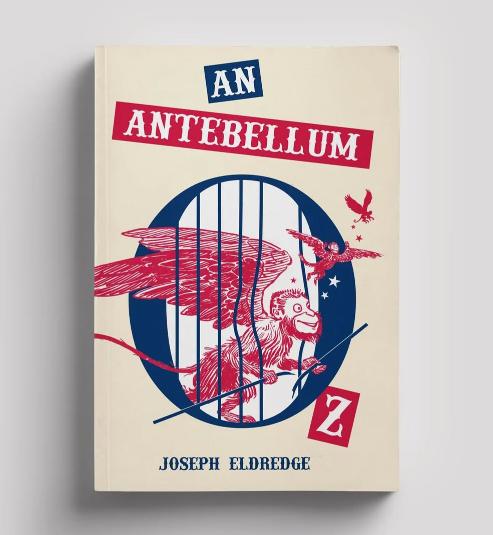
CLAIRE CONSIDERS
Antebellum Oz by Joseph Eldredge
Antebellum
Oz by Joseph Eldredge
Reviewed by Claire Hamner Matturro
Readers, are you ready to read something that is at once different and yet teasingly not?Abook that, for all its differences, still holds out some familiar Southern tropes, albeit in clever arms? A story that borrows the cast of a beloved childhood tale to spin something both familiar—yet still uniquely original? The inventive format and vivid imagination involved create this seemingly contradictory result: something both old and new, worn yet fresh.
Definitely and rather defiantly unusual in structure—part fiveact play, part epic poem, part mash-up with enough footnotes to all but qualify as an academic endeavor—Antebellum Oz (Choice Press, 2025) by Joseph Eldredge is a boldly reimagined take on The Wonderful Wizard of Oz. Instead of the Midwest of the original Oz, this story is set in the Deep South and, as the title suggests, in another century. Six young people—three free siblings and three enslaved youths—will soon be confronted with traumatic and dramatic change. If the coming “Freedom War” isn’t enough to transform their lives, a hurricane will hurry that process.
The story opens on April 11, 1861, on “The Master’s Farm,” described as a “little share-cropped sugar plantation that lived on a
Antebellum Oz by Joseph Eldredge
CLAIRE
Joseph Eldredge
little neck of the Mississippi.” On this farm, six teens—Dorothy, Tom, Jon, Harriet, Jim, and Ferdinand—live and work. In some ways mirroring the paradox of Southern history, white youth Tom hopes one day to build “a great Plantation on this riverbend! Free, where none are slaves but to industry.” Yet he also admits to being willing to use “the quirt in my hand.”
All their plans and hopes change when a hurricane lifts a cabin—where they are tending to the injured “master”—into dark clouds and deposits it, and them, in the land of Oz at night. The six youths are separated, with Dorothy and Ferdinand soon encountering seven dwarfs who thank them for crushing a witch with their cabin. Ferdinand comments: “This’ but the lip of the abyss… I surmise, / Landed on a witch’s head, this witching night / Will only wickedly end.” The dwarfs tell Dorothy and Ferdinand that to get home again, they must seek the help of Oz, who lives in a place called Uncle Sam Plantation.
Meanwhile, Jim and Jon land together, and a mysterious woman soon tells them that if they wish to get home, they must kill the man called Oz. Tom and Harriet wake in a cornfield, and Tom suffers a “crookedly broke left arm.” As the six set out on their various journeys to find the mysterious Oz, they encounter a scarecrow named Jim Crow, a tin man called the Klan Man, and a bloodhound named Brer-Lion “cuz I’m the biggest Hound in the House.” And yes, there are flying monkeys and witches too—plus plenty of conflict, confrontation, and adventure.
CLAIRE CONSIDERS
Given its unusual and at times challenging structure, Antebellum Oz requires readers to pay close attention to its complex formatting and numerous footnotes. The author calls it a “romance.” The publisher calls it “a work of literature.” The novel has an allegorical quality, spiced with entwining parables, and though there is darkness in it, there is also light. In the end, perhaps it’s best to say it’s a wonderfully imaginative and original work.
Eldredge should be congratulated for revitalizing Southern tropes by placing his characters and their story in a boldly reimagined Oz, while using lyrical language and poetry to convey their tales. There is rhythm in its iambic pentameter and music in the black-and-white words that suggest it would make an engrossing stage musical.
Joseph Eldredge is a poet, teacher, and scholar who lives in Colorado, in the heart of the Rocky Mountains. He is the author of A Town of James and An Andrew Jackson.

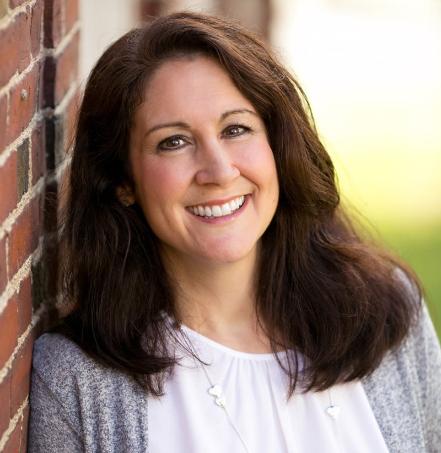
“In the tumultuous period in which we currently find ourselves, I’ve been trying to do what Mister Rogers suggested: Look for the helpers…”
Annie Mondesir asks Meredith O’Brien
What is your greatest fear?
Crashing my car off theroad or abridgeand into abody of water. My husband jokes that this is highly unlikely unless I’m driving like a madwoman, but every time I find a news story detailing just this scenario, I share it with him.
What is the trait you most deplore in yourself?
To paraphrase the indomitable Taylor Swift, being a pathological people pleaser.
What is the trait you most deplore in others? Duplicity.
What is your greatest extravagance?
I still get hard copy newspapers. There’s something about walking to the end of the driveway – a la Tony Soprano – to pick up the day’s newspapers that is very satisfying.
What is your current state of mind?
Seriously. Stressed. Out. (Anyone who keeps up with the news like I do is likely in a similar state.)
Which words or phrases do you most overuse?
Currently: “What happened now?!” tied with, “Are you f—--g kidding me!”
Which talent would you most like to have?
I’d love to be able to play the piano. I wanted to take virtual lessons during COVID but my then-college-aged kids who were taking their college courses virtually, unanimously begged me to wait until they were out of the house.
If you could change one thing about yourself, what would it be?
I’d like my multiple sclerosis to go away. Where would you most like to live?
Born and raised in Massachusetts, I currently live in the Boston area where I adore it. However, if I were to consider moving elsewhere, I’m intrigued by Dublin, which I visited for the first time last year.
What do you most value in your friends?
To paraphrase Nirvana – as a true Gen-Xer is wont – my friends allow me to come as I am. I can be my most authentic self without having to pretend.
Who are your favorite writers?
This question can sometimes be a trap where some folks will judge your responses to assess if you’re smart enough, well-read enough, edgy enough. However, because I don’t regularly read a single genre, I have difficulty picking some favorites. If pressed, I’d single out those who write about contemporary topics with authenticity, humor, and tremendous wit: Maria Semple, Elinor Lipman, Catherine Newman, Tom Perrotta, Kevin Wilson, and MonaAwad.
Who are your heroes in real life?
In the tumultuous period in which we currently find ourselves, I’ve been trying to do what Mister Rogers suggested: Look for the helpers. I look for the unsung people who are trying to make the world a little more humane, a little kinder, a little more just. I’m thinking of the people who go out and protest when they see their migrant neighbors scooped up off the streets by armed, masked men and whisked away. I’m thinking of groups that help migrant families find their loved ones afterward. I recently saw an image of
an unarmed minister who’d been protesting in front of an ICE facility in Chicago, standing in front of a phalanx of heavily-armed ICE agents. The minister had his eyes closed and was fending off some kind of chemical agent being sprayed by an officer in his direction. Those who are helping others in this moment of American crisis, they are the ones who are heroic.
Meredith O'Brien is an award-winning author of several books, ranging from novels to a memoir and works of creative nonfiction. She has two books slated for release in 2025, "Uncomfortably Numb 2," a guide for MS patients and "Louie on the Rocks," a novel about a family torn apart by politics and substance abuse issues. She's working on a nonfiction book about a thirtysomething Massachusetts minister in her first year of ministry. She teaches journalism and creative nonfiction writing in Massachusetts.An avid fan of current events (she's a serious news junkie), pop culture, the Red Sox, Liverpool football, and coffee, Meredith lives in the Boston area with her spouse and two dogs, Max and Tedy.

"This follow-up to O'Brien's memoir, Uncomfortably Numb (2020), follows several multiple sclerosis patients and experts on their emotional journeys. Many of the people presented here have faced similar challenges with aspects of their illness, from dealing with insurance and prescription drug cost issues to other people's judgement of using theAmerican with DisabilitiesAct when their symptoms aren't visible to others.Aproject that many will find relatable." -
KIRKUS REVIEWS
Uncomfortably Numb 2:AnAnthology for Newly-Diagnosed MS Patients
Meredith O'Brien

Finding Inspiration in Unexpected Places
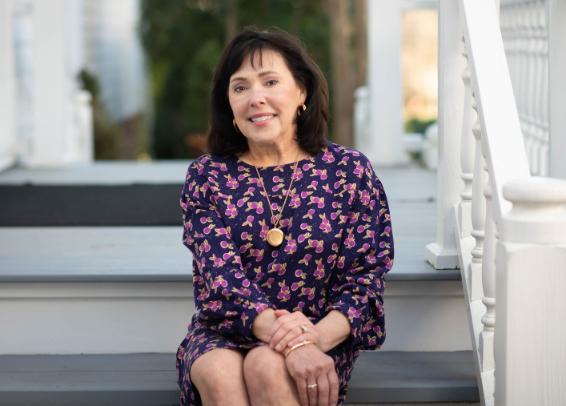
THE WRITER’S EYE with
Susan Beckham Zurenda
and guest author Cynthia Martin
Three Ways to Rub the Genie out of the Lamp
I really enjoy being invited to be in conversation with authors at my hometown Hub City Bookshop. In the summer of 2022, I had the pleasure of speaking with award-winning author Cynthia Martin when she was touring her novel Tidal Flats. I loved this novel about a young married couple navigating the line between autonomy and the life they want together.
Cynthia has a goal of visiting an indie bookstore and being in conversation with a local author in all 50 states. She’s at 26 and counting. She is the author of three novels, and numerous stories published in literary magazines. Her Substack features the “How We Spend Our Days” series, over a decade of essays by writers on their lives. I was intrigued by her process of inspiration: We all know what it feels like. As if we’re taking dictation instead of having to think things up. As if the words have tiny motors or wings. While we can’t push a button for inspiration, we can create favorable conditions. If you’re in need of a little inspiration, here are three ways to coax her into the room.
One: By cleaning out files
In January of 2020, when I was ready to start the novel I’m about to finish, I had no idea what I wanted to write about. What I did have were lots of digital files and colorful folders containing articles torn from magazines, essays by others, character descriptions, scenes, flashes of interior monologue, pages of something. So I cleaned out my writing drawer in my study, and I cleaned out my writing folder on my computer, printing what I had there. I placed each item in a separate folder. When I was done, I counted. 116 folders. I gave each a title, which helped me focus: (1) blackbirds, (22) cadaver dogs, (30) we had a little trouble Saturday night, (71) female burglar, (99) I swear mom is jealous, (105) wingwalker … Then I sat on my sofa with all 116 folders, and I started reading. I created two piles: No Longer Lights Me Up and Still Feeling That Energy. It took me a few days to read through all 116, but once I’d finished, I packed up the No Longers and started reading again with the now shorter stack of Still Feelings. I kept reading and sorting and putting away. By the end of the week, I’d arrived at a shortlist of 15 items. Interestingly, each of these 15 was a piece of writing I had started. I took a day off, and then I resumed reading and sorting until I’d cycled through three times without discarding anything. What remained were 6 documents, each with writing that was begging me to dig deeper, and a magic lamp of inspiration spewing one genie after another with ways these 6 completely unconnected pieces of writing might come together for a novel.
Two: By invitation
During the writing of my novel Love Like This, one of the characters owned three trailers. I knew who lived in two of them, and instead of just putting someone in the third, I took an index card out of a drawer and wrote the question: Who lives in the third trailer? I left it on my desk.Aweek later it came to me.
Another way to invite inspiration in, which might be more familiar, is to step away from your desk, in effect announcing that your left brain is done for the day. Take a shower, a walk, a drive— do anything except write. This method works especially well if you’re working every day on a particular project. Again for Love Like This, I would wake up in the middle of the night with lines of dialogue, and I remember pulling over a mile from my house to write the last scene of the book.
Three: By slamming the door shut
One long-ago November I finished writing Love Like This, and I decided to take December off from writing. I needed a break to clear my head and refill the well.Also, January is my favorite time to start a new novel.
A week later, I was watching a movie with my husband when three things popped into my head. No writing, I told it. And to make sure it knew I was serious, I did not even make a note. As kids started arriving for the holidays, the same three things interrupted Neil Diamond singing “Halleluiah.” I’m taking a break, I said, shaking my head like an Etch-A-Sketch. Then the
THE WRITER’S EYE with guest author Cynthia
Martin
day after Christmas, as I bent over to pick up trash to put in the black plastic bag I was holding in the other hand, there they were again, and this time, I found a pen and a piece of paper.
Number one, my next novel would again be about a marriage. Number two, either the husband or the wife would have something to do with the Vietnam War or the War in Afghanistan. And three, the title of the book would be All’s Fair. Which it was not. But seven years and nine months later, Tidal Flats was published.



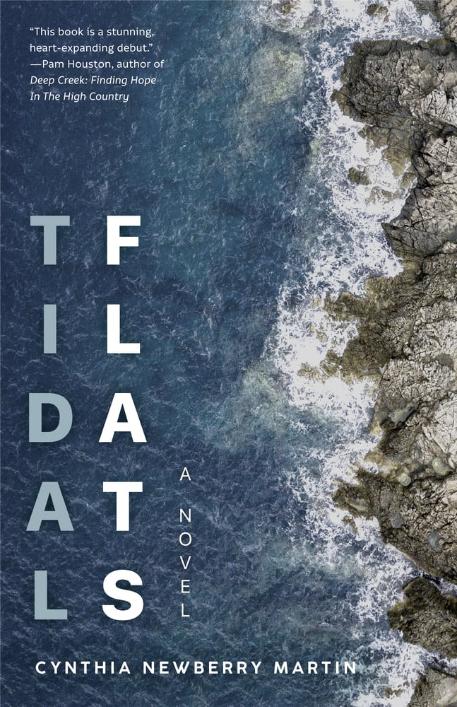
"I've
been waiting a long time for this book." ―
Rebecca Makkai, author of
The Great
Believers
and Music for Wartime
2020 IPPY Award Winner for Literary Fiction
2020 NIEA Winner for General Fiction and Best Cover
Tidal Flats:ANovel (Sense of Self, Deconstructed Lovers, Choices)
Cynthia Newberry Martin


2-year/60-hour Program
Study One-on-One withAward-Winning Writers
Online Courses
Learn from Home
3 Writing Residencies
3 Entry Points to Start in the Program
Beautiful Rural Campus Nestled in the Etowah Valley (550+ acres)
Nestled in the shadow of Pine Log Mountain for the perfect writing experience, the Etowah Valley is a bridge betweenAtlanta and theAppalachian South, where nature meets culture. At Reinhardt University’s Etowah Valley Master of Fine Arts (MFA) Low-Residency Program writers create a literature that is story-driven and grounded in the places where we live, whether rural or urban.
Each summer, students visit our beautiful campus in North Georgia for a 10-day intensive residency to be immersed in writing daily writing workshops, craft classes, experiential excursions into natural and urban environments, and nightly readings on campus from our visiting writers.
Our students travel from all over the United States to attend the summer residency to learn from some of the finest writers. In doing so, they embody a unique mixture of cultural traditions and lifestyles.Amid the thrivingAtlanta film scene and Southern environmentalism, we believe in the art of storytelling that develops voice and meaning to the individual artist.
For more information, visit the MFA website or contact the MFA director, William Walsh, at bjw@reinhardt.edu
Core Faculty:
Anjali Enjeti (creative non-fiction/fiction)
Southbound: Essays on Identity, Inheritance, and Social Change The Parted Earth
Jessica Handler (creative non-fiction/fiction) The Magnetic Girl Invisible Sisters
Soniah Kamal (fiction)
An Isolated Incident Unmarriageable
Donna Coffey Little (poetry/fiction) Fire Street
Wofford’s Blood
Michael Lucker (screenwriting)
Crash! Boom! Bang! How to Write Action Movies Rule One
Past Visiting Writers:
Laura Newbern (poetry)
Love and the Eye A Night in the Country
Gray Stewart (fiction) Haylow
Megan Volpert (poetry/creative non-fiction)
Why Alanis Morissette Matters Boss Broad
William Walsh (poetry/fiction)
Haircuts for the Dead Fly Fishing in Times Square
John Williams (fiction/creative non-fiction) End Times
Monroeville and the Stage Production of To Kill a Mockingbird
Adrian Blevins, Daniel Black, David Bottoms, Richard Blanco, Earl Braggs, Jericho Brown, Annemarie Ni Churreáin, Denise Duhamel, Stephen Dunn, Pam Durban, Alice Friman, Anthony Grooms, Beth Gylys, Ann Hite, Kristie Robin Johnson, Andrea Jurjević, John Lane, Ellen Malphrus, Reginald McKnight, Christopher Noel, Robert Olmstead, Janisse Ray, Megan Sexton, George Singleton, Sharon Strange, Chika Unigwe, Monica Lee Weatherly


I’m an indie author of two short story collections – Walking the Wrong Way Home and Sharp as a Serpent’s Tooth – Eva and Other Stories, and a novella, Oliver. I’m the editor and designer of WELL READ Magazine’s Best of 2023, and Best of 2024 anthologies, the Encounters With Nature anthology, and coeditor of The Best of the Shortest: A Southern Writers Reading Reunion. I’m also a freelance writer for Amelia Islander Magazine, and the Editor in Chief and Publisher of WELL READ MAGAZINE.
I’ve learned so much about formatting, interior design, cover design, and self-publishing since my first short story collection came out and oddly enough, I’ve had fun doing it! But it can be frustrating and overwhelming trying to figure it all out on your own. I’d like to use what I’ve learned to help you.
Whether you’re thinking of self-publishing, querying agents or small presses, I can get your manuscript ready to send out without costing a fortune or waiting for months for a finished product.
Cover Design Pricing starts at $250 - Price include covers for both your print and ebook with unlimited tweaks until it’s perfect. See the next page for a few examples of covers I’ve created.
Interior formatting - $1 per page, $2 per page if edits will be needed. Photos and/or images included in your manuscript - $2 each
Professional Critique - $2 per page
For more information, click here, or contact me at mandy@mandyhaynes. com for a free consultation.






You come to the city because your passion called you here. Whatever that passion may be. That thing you love. And you wander out into the streets searching for a place to pull up a stool, order a drink, chat with the bartender about all things divine.
Welcome to God On The Rocks. Serving up great drinks and soulful conversations since time began.





I’m looking for Authors Interviewing Authors and would love to shine a spotlight on your favorite Independent Bookstores, Book Sellers, Libraries, and Librarians.
These pages are a great way to let readers know who you are and they are FREE.
Send orders for ads, interviews, or the stories mentioned above, as well as any questions about the magazine to:

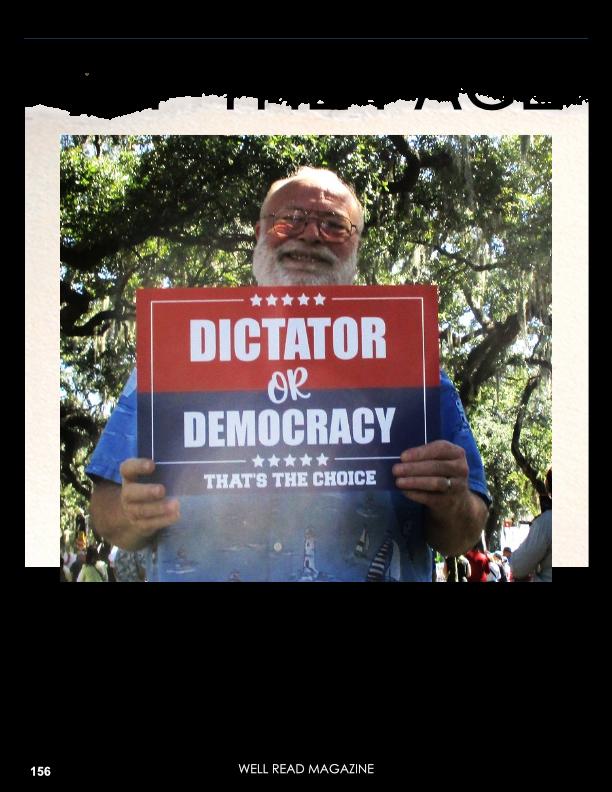

looking for something to burn down. Tom, if you hold on a minute, I will tell you to stick it where the sun don’t shine in 137 languages. Having failed to get myself recruited by a terrorist cell, I decided to look for signs that I was participating in “a tantrum dressed up as a revolution,” which is how J.D. Vance described yesterday’s peaceful and lawful demonstration by 7,000,000Americans across this country. Now, back in the day I had four children, so I know what a tantrum looks like, but I did not see a single participant at my event hold their breath, burst into tears, or stomp off to their room. What I did see was American citizens exercising their Constitutionally-guaranteed right to free speech in the face of their own government’s attempts to denigrate the exercise. So in response to J.D. Vance I say, just because you have been put into the spotlight by a selection of billionaires who believe you may someday suit their nefarious purposes, don’t mistake your good fortune for ability. Oh, and the mascara thing is not working for you. Oh, and I read your book. It wasn’t very good.
I don’t want to forget Christian Barbie—Caroline Leavitt—who had plenty to say about the protests. I realize that she has never had an original thought in her life, and her entire job is to defend the indefensible while attempting to look perky—her boss likes them young and perky—but she still just ran that mouth all week leading up to the event. She claimed that the Democratic Party’s “main constituency are made up of Hamas terrorists, illegal aliens and violent criminals.” Well damn, Caroline. What did Jesus have to
say about being nice? And lying? And having little temper fits when an actual journalist asks you an actual legitimate question? Anyway, I looked. I scoured Emmit Park from one side to the other looking for violent criminals. What I saw was old folks like me, and young people, and children, and dogs, and a ship that went by on the Savannah River, and policemen, and ACLU watchers, and League of Women Voters watchers, and many volunteers from all walks of life, but not one single violent criminal. How can I be sure? Well, they always wear those striped shirts and those little masks to cover their eyes, and sometimes they wear derbies. I did not bother to look for illegal aliens because of the abovementioned dogs, which had not been eaten. Also, if I were an illegal alien, the last place you would find me is at a No Kings rally. They may or may not be illegal, but they are not stupid.
According to Transportation Secretary and former B-list reality star Sean Duffy, the No Kings protests were “part of Antifa” and involved paid protesters. This confused me because I had not yet received a check, so while I was there I roamed around looking for Antifa jackets—you know, like the Hell’s Angels wear—or perhaps a sign-up booth for this infamous nationwide organization where I could check on the status of my money. As it turned out, antifa is an acronym for anti-fascist, and there is no actual club, and all 5000 of us there in Savannah were antifas, and nobody got paid. Sigh. Given the state of I-16 on my way home from Savannah, my advice to Sean is to worry about roads and such and leave the antifa-ing to better people.
I am 70 years old, and in my years on this planet I have developed certain expectations. I expect my coffee to be hot and my ice cream to be cold. I expect my cars to last 200,000 miles and my paint to last 20 years. I expect people in public office to be honest, respectful, and dignified. They are there to serve us. That is their sole purpose. And I expect my Presidents to behave like adults and not like 11-year-old boys who have stolen their dad’s password for the family computer. This leads me up to Trump’s response to No Kings Day. There were actually two different ones. The first was when, right after his weekly round of golf at one of his own courses that I guarantee you the taxpayers get billed for, he posted an AI generated video of himself—wearing a king’s crown—flying a fighter jet which dropped excrement onto No Kings protestors. 7,000,000 peaceful, America-loving, patriotic No Kings protestors. No kings, y’all.And no insane kings, for sure.
The second response concerned the White House, which is currently not as big as it used to be. Specifically, King Donald had the East Wing bulldozed on the first workday after the No Kings protests, and I guess we all got that. Frankly, I’d rather be shat upon by an AI cartoon. The only reason we know the East Wing was being bulldozed is because Treasury Department employees, who work next door, defied a White House order by sharing photos taken from their offices of a national historic landmark being leveled. It is a certainty that these honest folks will soon be unemployed, so if you are hiring—and you probably aren’t, given
the shambles he has made of the economy—please keep them in mind.
There has been a great deal of discussion about whether or not he could actually do what he is doing, but as we all know, he does not care about this. If he wants to do something that he should not or legally cannot do, he does it anyway, and if you don’t like that, then you can suck on it. If he doesn’t want to do something that he is supposed to be doing, then no amount of law or custom can make him, and if you don’t like THAT, well, you can suck on it as well. This is what happens when the President of the United States chooses to run the country he was elected to serve and protect like a closely-held corporation put there for his own personal benefit. He is running this country like it is an extension of The Trump Organization because that is all he knows. Defraud investors? Pfft. Cook the books? It’s just accounting. Defaulting on loans and bankruptcy as business strategies? What? Conversion of funds? Oh, please. Unless you are a diehard MAGA—and there are still so, so many of those, even though Trump has screwed most of them over by now—you know that the above-referenced enterprise is beyond shady, and the government he now controls has become so as well.
Ironically, in this case, due to a huge loophole in the law, he actually has the authority to do what he is doing. Any one of the other 45 Presidents could have done this at any time. The point here is, none of them did. Even Richard Nixon, who until very recently was the worst President of my lifetime, had more class
than to tear down part of the White House for no other reason than to stroke his own ego. But here we are. There are currently no approved plans to rebuild, no permits, no signs of weatherproofing for a construction project begun just before winter, and no indication that the history or the paintings or the artifacts in the East Wing were preserved. There is only the destruction of the People’s House.
Strictly as an aside while my coffee is brewing, how long do you suppose it will be before genuine pieces of the East Wing show up on eBay? We are all quite aware of the lack of oversight and transparency during these the final days of what was once the shining star of the world. Is anyone keeping an eye on the guys driving the dump trucks? Is the demolition crew an approved and vetted government contractor? Was the job placed for bids? Sorry. The coffee is ready, and my weekly digression is now concluded.
Trump loyalists have made a lot of noise about his contention that the Ballroom Project is being paid for by private donations and not taxpayer funds, so why don’t we just shut the f**k up. If you believe that is true—and if it is it would be the first true thing he has said in a long time—then you know how that actually works, right?
Trump to billionaire buddy or CEO: Hey, I need $10 million for a little project I am putting together.
Billionaire buddy or CEO to Trump: What’s in it for me?
Trump to billionaire buddy or CEO: Well, what do you want?
Billionaire buddy or CEO toTrump: (presents wish list, which will ultimately cost the taxpayers more than if they had just paid for the damn thing themselves).
Trump to billionaire buddy or CEO: Done and done! Say hello to Barb and the kids for me.
Billionaire buddy or CEO to Trump: (cuts check) Let’s do lunch.
As yet another aside, do current Trump loyalists not ever stop to consider what happened to past Trump loyalists? The man uses people up and then throws them away. To me it seems that it might be safer to be a coal miner or a sawmiller than it is to cozy up to Donald Trump. Perhaps the current crop should ask John Bolton, James Comey, Gen. John Kelly, William Barr, Mark Esper, Rex Tillerson, Mick Mulvaney, Stephanie Grisham, Anthony Scaramucci, Elaine Chao, Betsy DeVos, Dan Coats, John Ratcliffe, and Tom Bossert what, exactly, their loyalty bought them.
Anyway, to conclude, we are well on our way to the People’s House looking like a New Orleans whorehouse. Okay, to be clear, I have never actually been inside of a New Orleans whorehouse, but I thought the phrase really sang, so I used it anyway. I have to tell you; I go to bed each night more tired than I have ever been, and I wake up each morning awash in a sea of dread. Have you ever seen one of those videos of a building or a stadium being demolished with explosives? That is what it feels like to me right now as I watchAmerica burn.


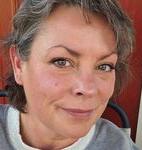
Mandy Haynes, Editor-in-Chief, Designer, Publisher, & Founder
Mandy Haynes is the author of two short story collections, Walking the Wrong Way Home, Sharp as a Serpent's Tooth Eva and Other Stories, and a novella, Oliver. Her stories have appeared in several anthologies and literary journals. She is the editor and designer of Encounters with Nature, a collaboration ofAmelia Island Writers and Artists, The WELL READ's Best of 2023 anthologies, and also the co-editor of The Best of the Shortest: A Southern Writers Reading Reunion.



Raymond L.Atkins, Contributing Editor for OFF THE PAGE
Raymond L. Atkins resides in Rome, Georgia, on the banks of the Etowah River in an old house with a patient wife and a lazy cat. His hobbies include people-watching, reading, and watching movies that have no hope of ever achieving credibility. His first novel, The Front Porch Prophet, was published in 2008 and was awarded the Georgia Author of the Year Award for First Novel. Camp Redemption, was awarded the Ferrol Sams Award for Fiction and the 2014 Georgia Author of the Year Award for Fiction. Sweetwater Blues was a Townsend Prize nominee, the 2015 GeorgiaAuthor of the Year runner-up for fiction, and the 2016 selection for One Book, Many Voices. South of the Etowah, his first creative non-fiction book, was released in 2016. It was nominated for a Push-cart Prize and was the 2016 GeorgiaAuthor of theYearAward runner-up for essay. In 2017, he was awarded the Lifetime Achievement Award by the Georgia Writers Association.


Robert Gwaltney, Contributing Editor for INSIDE VOICES
Robert Gwaltney, award winning author of southern fiction, is a graduate of Florida State University. He resides in Atlanta Georgia with his partner, where he is an active member of the Atlanta literary community. Robert’s work has appeared in such publications as The Signal Mountain Review and The Dead Mule School of Southern Literature. His debut novel, The Cicada Tree, won the Somerset Award for literary fiction. In 2023, Gwaltney was named Georgia Author of the Year for first novel.

Meet the staff


Ann Hite, Contributing Editor for MOUNTAIN MAGIC
In September of 2011 Gallery, an imprint of Simon & Schuster, published Ann Hite’s first novel, Ghost on Black Mountain. In 2012 this novel was shortlisted for the Townsend Prize, Georgia’s oldest literary award. In the same year, Ghost on Black Mountain won Hite Georgia Author of the Year. She went on to publish four more novels, a novella, memoir, and most recently Haints On Black Mountain: A Haunted Short Story Collection from Mercer University Press. In December 2022, Haints On Black Mountain was one of ten finalist for the Townsend Prize. The collection was a Bronze Winner in Foreword IndieAward 2023 and GeorgiaAuthor of the Year Second Place Winner for Short Stories 2023. Ann received a scholarship to the Appalachian Witers Workshop Hindman Settlement in the summer of 2020 and was invited back in 2021. Her passion for history influences all her work.


Jeffrey Dale Lofton, Contributing Editor for INSIDE VOICES
Jeffrey Dale Lofton hails from Warm Springs, Georgia. His years telling the stories of playwrights and scriptwriters as a stage and screen actor taught him the pull of a powerful story arc. Today, he is Senior Advisor at the Library of Congress, surrounded by books and people who love them. Red Clay Suzie is his debut novel, a fictionalized memoir written through his lens—gay and living with a disability—in a conservative family in the Deep South. It was longlisted for the 2023 Center for Fiction First Novel Prize and awarded the Seven Hills Literary Prize for Fiction, among other distinctions.

Dawn Major, Contributing Editor for TRIPLIT with D Major
Dawn Major’s debut novel, The Bystanders, was named finalist for 2024 GeorgiaAuthor of the Year for Best First Novel. Major is an associate editor at Southern Literary Review and advocates for southern authors via her blog, Southernread. Her literary awards include the following: the Dr. Robert Driscoll Award, Reinhardt University’s Faculty ChoiceAward, and the James Dickey Review Literary Fellowship. Major is a member of the William Gay Archive and has edited and helped publish the works of the late author. She serves on the board for Broadleaf Writers Association and is also a member of M’ville, anAtlanta-based artist salon. Major lives in the Old Fourth Ward inAtlanta, GA and is working on her next novel, The Dandy Chronicles.

Claire Hamner Matturro , Contributing Editor for CLAIRE CONSIDERS
Claire Hamner Matturro is a former attorney, former university writing instructor, avid reader, and the author of seven novels, including four published by HarperCollins. Her poetry appears in various journals including Slant and Lascaux Review. She is an associate editor ofThe Southern LiteraryReview and lives happily in Florida with her cross-eyed rescued black cat and her husband.



Annie McDonnell, Contributing Editor forANNIEASKS
Founder of The Write Review Literary Community, Podcaster, Book Reviewer, Author Consultant and Matchmaker. She also teaches workshops on top of all of this!Annie has been introducing us to books and authors since 2006, when she began reviewing books for Elle Magazine. Proud Stiff Person Syndrome Warrior, and several other illnesses.


Susan
Beckham Zurenda, Contributing Editor for THE WRITER’S
EYE
Susan Beckham Zurenda taught English for 33 years on the college level and at the high school level toAP students. She is author of the award-winning Southern literary novel, Bells for Eli, and the recipient of numerous awards for her short fiction, including the South Carolina Fiction Awards, twice. Her second novel, The Girl From the Red Rose Motel (Mercer University Press, September 2023), was the recipient of the 2024 Patricia Winn Award in Southern Fiction, Gold Medal winner in the 2024 IPPY Awards for Southeast Fiction, a 2024 Pushcart Prize nominee, a Shelf Unbound 2023 Notable 100 books, and a finalist in theAmerican Book FestAwards. Susan lives in Spartanburg, SC.

Sanctify by Mandy Haynes
Cora's husband said the beatings were for her own good, that he was trying his best to free her from sin. But as she watched him sweat behind the pulpit, she wondered which one of them would be freed first. She listened to her husband standing behind the pulpit, watched him gesture wildly, heard him proclaim the word “sanctify.” Cora had heard this particular sermon more than once in the eleven long years they’d been married. When she first heard it, she believed in a loving and forgiving God. She trusted a God who took care of his children. But if it was her up there preaching, she’d warn everybody in the house to take care of yourself.
No one else would do that for you. Vernon screamed, “Sanctify, children!”
But Cora heard another word altogether. Sac-ri-fice!
Sanctify is a story found in the collection, Walking the Wrong Way Home
5.0 out of 5 stars One of the most compelling story/book writers in America.
5.0 out of 5 stars Will leave you wanting more!
5.0 out of 5 stars A Southern Voice to Remember
5.0 out of 5 stars Lyrical prose, picturesque settings, and vividly drawn characters


